Exhibit 3.77
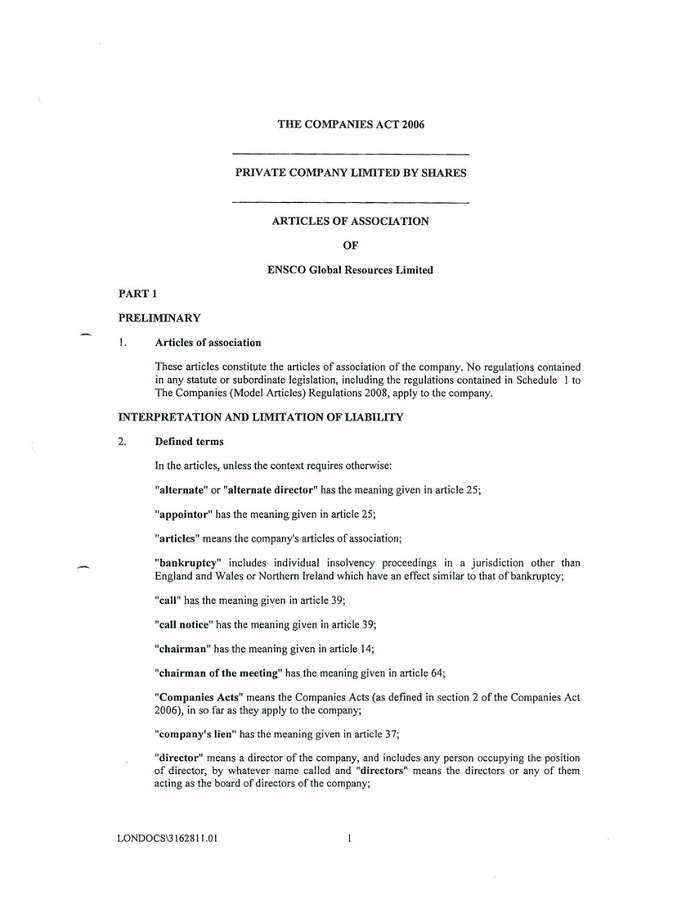 | THE COMPANIES ACT 2006 PRIVATE COMPANY LIMITED BY SHARES ARTICLES OF ASSOCIATION OF ENSCO Global Resources Limited PARTl PRELIMINARY I.Articles of association These articles constitute the articles of association of the company. No regulations contained in any statute or subordinate legislation, including the regulations contained in Schedule I to The Companies (Model Articles) Regulations 2008, apply to the company. INTERPRETATION AND LIMITATION OF LIABILITY Defined terms In the articles, unless the context requires otherwise: "alternate" or "alternate director" has the meaning given in article 25; "appointor" has the meaning given in article 25; "articles" means the company's articles of association ; "bankruptcy" includes individual insolvency proceedings in a jurisdiction other than England and Wales or Northern Ireland which have an effect similar to that of bankruptcy; "call" has the meaning given in article 39; "call notice" has the meaning given in article 39; "chairman" has the meaning given in article 14; "chairman of the meeting" has the meaning given in article 64; "Companies Acts" means the Companies Acts (as defined in section 2 of the Companies Act 2006), in so far as they apply to the company; "company's lien" has the meaning given in article 37; "director" means a director of the company, and includes any person occupying the position of director, by whatever name called and "directors" means the directors or any of them acting as the board of directors of the company; |
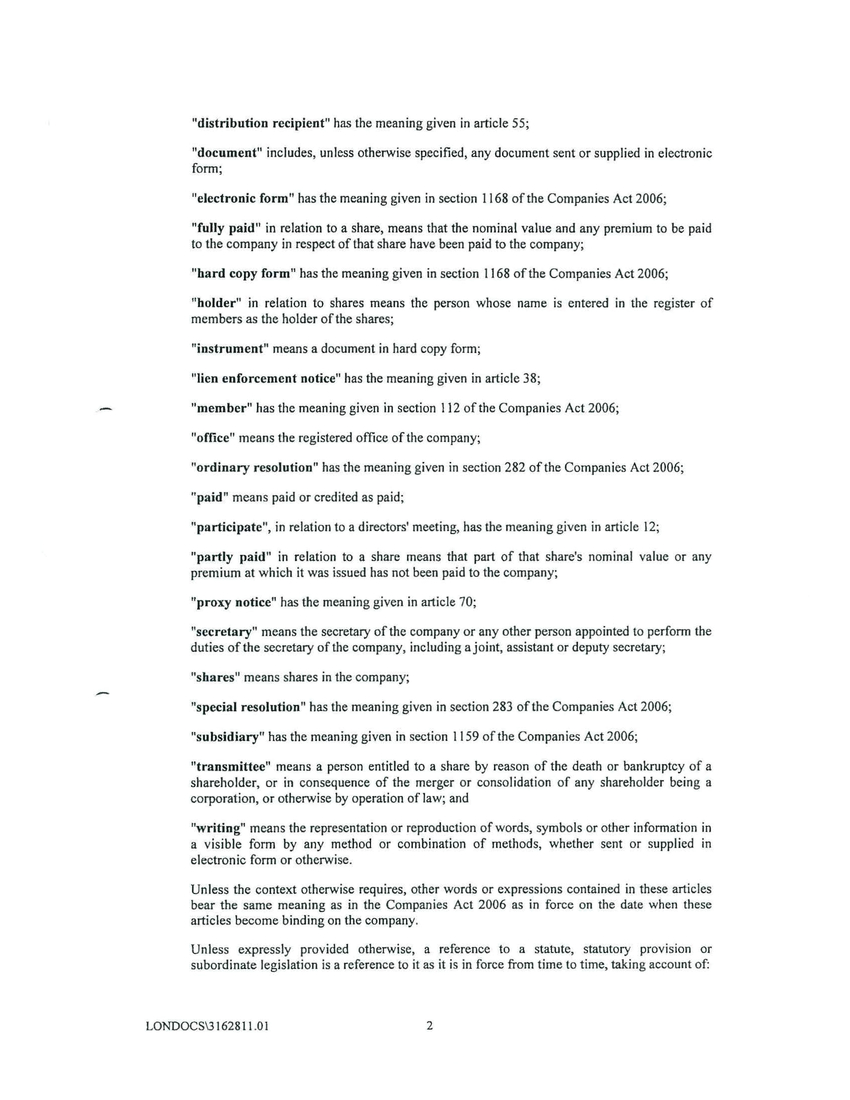 | "distribution recipient" has the meaning given in article 55; "document" includes, unless otherwise specified, any document sent or supplied in electronic form; "electronic form" has the meaning given in section 1168 of the Companies Act 2006; "fully paid" in relation to a share, means that the nominal value and any premium to be paid to the company in respect of that share have been paid to the company; "hard copy form" has the meaning given in section 1168 of the Companies Act 2006; "holder" in relation to shares means the person whose name is entered in the register of members as the holder of the shares; "instrument" means a document in hard copy form; "lien enforcement notice" has the meaning given in article 38; "member" has the meaning given in section 112 of the Companies Act 2006; "office" means the registered office of the company; "ordinary resolution" has the meaning given in section 282 of the Companies Act 2006; "paid" means paid or credited as paid; "participate", in relation to a directors' meeting, has the meaning given in article 12; "partly paid" in relation to a share means that part of that share's nominal value or any premium at which it was issued has not been paid to the company; "proxy notice" has the meaning given in article 70; "secretary" means the secretary of the company or any other person appointed to perform the duties of the secretary of the company, including a joint, assistant or deputy secretary; "shares" means shares in the company; "special resolution" has the meaning given in section 283 of the Companies Act 2006; "subsidiary" has the meaning given in section 1159 of the Companies Act 2006; "transmittee" means a person entitled to a share by reason of the death or bankruptcy of a shareholder, or in consequence of the merger or consolidation of any shareholder being a corporation , or otherwise by operation of law; and "writing" means the representation or reproduction of words, symbols or other information in a visible form by any method or combination of methods, whether sent or supplied in electronic form or otherwise. Unless the context otherwise requires, other words or expressions contained in these articles bear the same meaning as in the Companies Act 2006 as in force on the date when these articles become binding on the company . Unless expressly provided otherwise, a reference to a statute, statutory provi sion or subordinate legislation is a reference to it as it is in force from time to time, taking account of: |
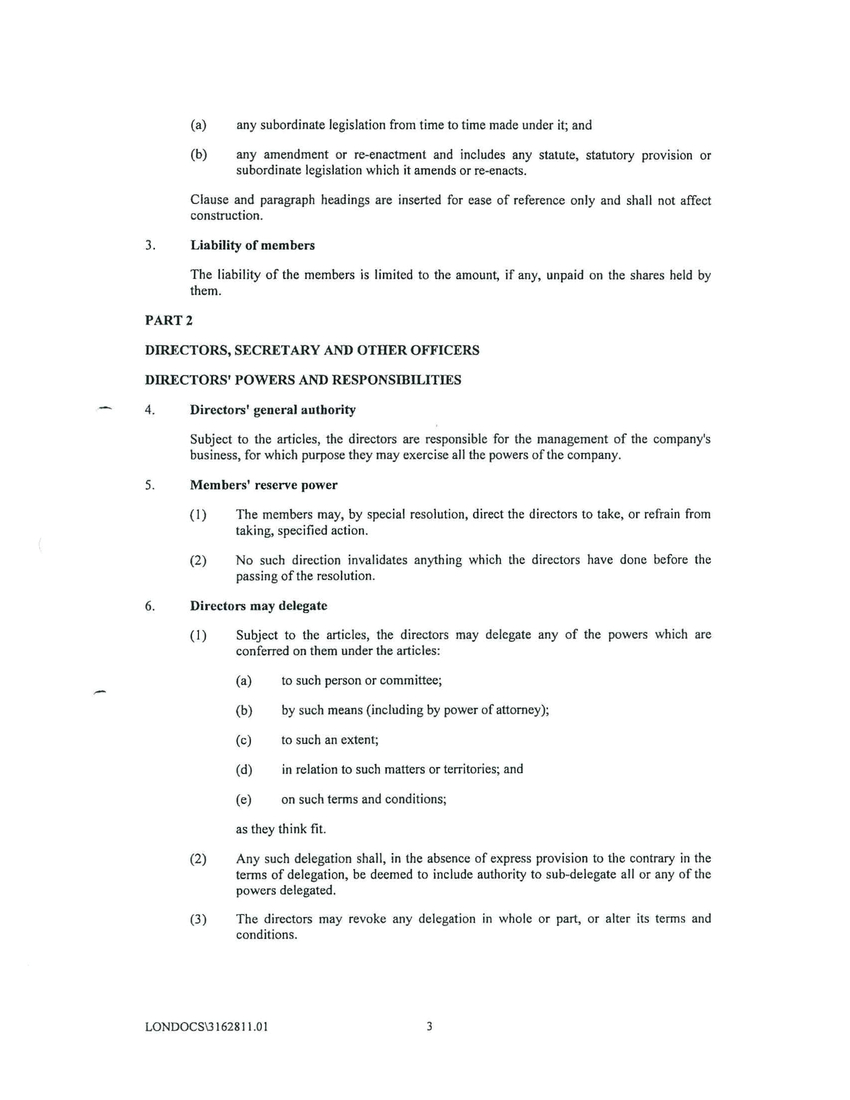 | any subordinate legislation from time to time made under it; and any amendment or re-enactment and includes any statute, statutory provision or subordinate legislation which it amends or re-enacts. Clause and paragraph headings are inserted for ease of reference only and shall not affect construction. Liability of members The liability of the members is limited to the amount, if any, unpaid on the shares held by them. PART2 DIRECTORS, SECRETARY AND OTHER OFFICERS DIRECTORS' POWERS AND RESPONSIBILITIES Directors' general authority Subject to the articles, the directors are responsible for the management of the company's business, for which purpose they may exercise all the powers of the company. Members' reserve power (I)The members may, by special resolution , direct the directors to take, or refrain from taking, specified action. (2)No such direction invalidates anything which the directors have done before the passing of the resolution . Directors may delegate Subject to the articles, the directors may delegate any of the powers which are conferred on them under the articles: - by such means (including by power of attorney); to such an extent; in relation to such matters or territories; and on such terms and conditions; as they think fit. Any such delegation shall, in the absence of express provision to the contrary in the terms of delegation, be deemed to include authority to sub-delegate all or any of the powers delegated. The directors may revoke any delegation in whole or part, or alter its term s and conditions . |
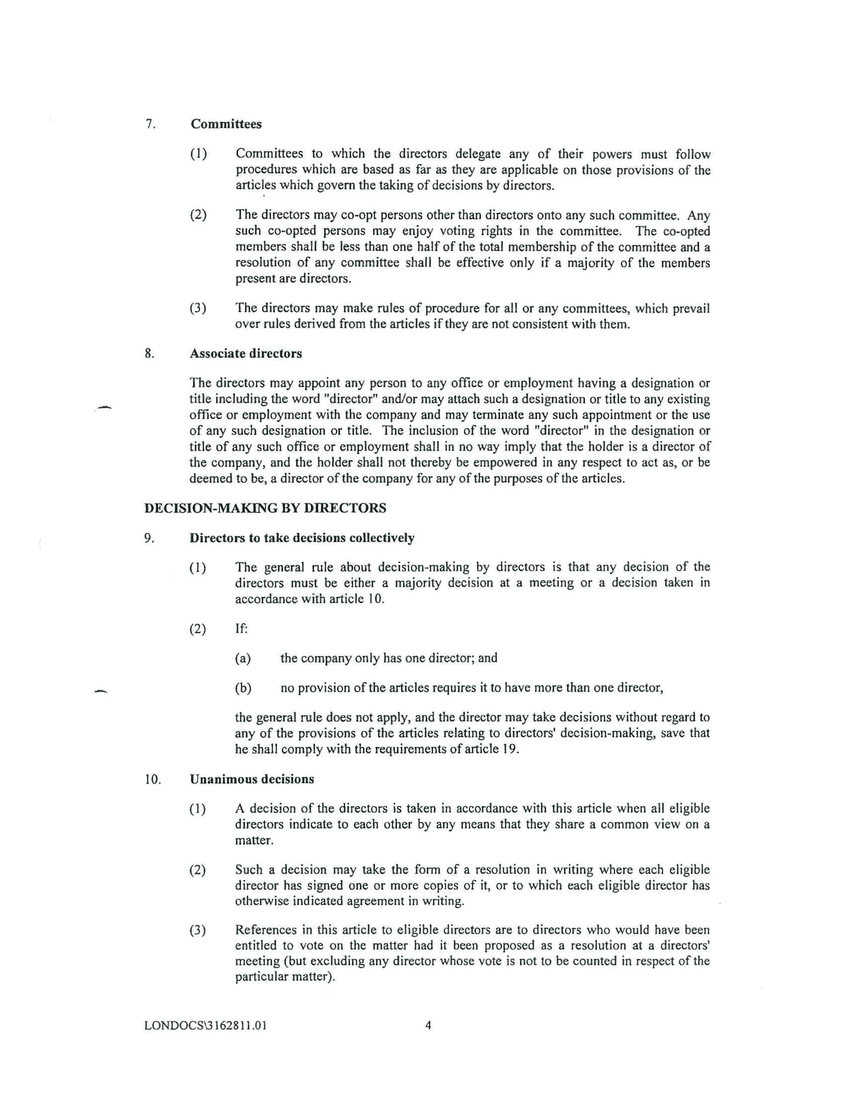 | Committees Committees to which the directors delegate any of their powers must follow procedures which are based as far as they are applicable on those provi sions of the articles which govern the taking of decisions by directors. The directors may co-opt persons other than directors onto any such committee. Any such co-opted person s may enjoy voting rights in the committee. The co-opted members shall be less than one half of the total membership of the committee and a resolution of any committee shall be effective only if a maj ority of the members present are directors. The directors may make rules of procedure for all or any committees, which prevail over rules derived from the articles if they are not consistent with them . Associate directors The directors may appoint any person to any office or employm ent having a designation or title including the word "director" and/or may attach such a designation or title to any existing office or employment with the company and may tennin ate any such appointment or the use of any such designation or title. The inclusi on of the word "director" in th e designation or title of any such office or employment shall in no way imply that the holder is a director of the company, and the holder shall not thereby be empowered in any respect to act as, or be deemed to be, a director of the company for any of the purposes of the articles. DECISION-MAKING BY DIRECTORS Directors to take decisions collectively The general rule about decision -making by directors is that any decision of the directors mu st be either a majority decision at a meeting or a decision tak en in accordance with article I 0. If: the company only ha s one director; and no provi sion of the articles requires it to hav e more than one director, the general rule does not apply, and the director may take deci sions without regard to any of the provisions of the articles relating to directors' decision-making, save that he shall comply with the requirement s of article 19. JO.Unanimous decisions A decision of the directors is taken in accordance with this article when all eligible directors indicate to each other by any mean s that they sh are a common view on a matter. Such a decision may take the form of a resolution in writing where each eligible director has signed one or more copies of it, or to which each eligible director has otherwise indicated agreement in writing. References in this article to eligible d irectors are to directors who would have been entitled to vote on the matter had it been proposed as a resolution at a directors' meeting (but excluding any director whose vote is not to be counted in respect of the pa rticular matter). |
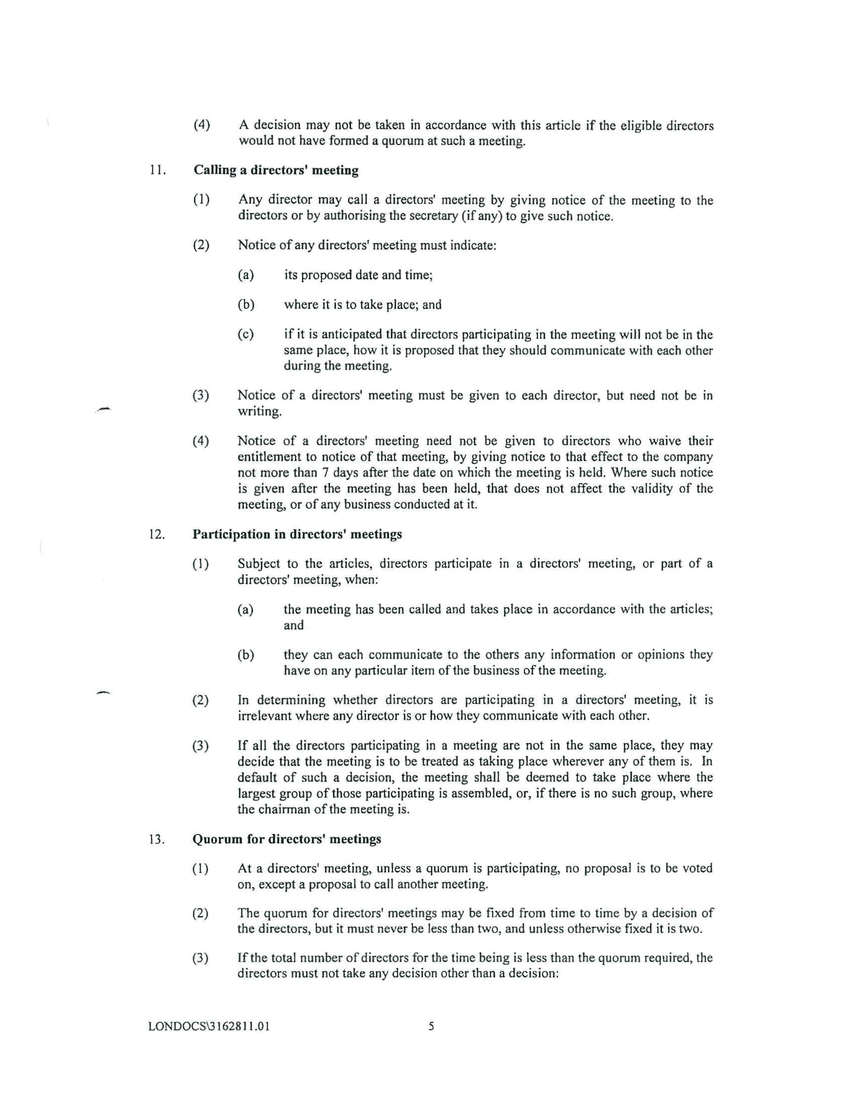 | A decision may not be taken in accordance with this article if the eligible directors would not have formed a quorum at such a meeting. Calling a directors' meeting Any director may call a directors' meeting by giving notice of the meeting to the directors or by authorising the secretary (if any) to give such notice. Notice of any directors' meeting must indicate : its propo sed date and time; where it is to take place; and if it is anticipated that directors parti cipating in the meeting will not be in the same place, how it is proposed that they should comm unicate with each other during the meetin g. Notice of a directors' meeting mu st be given to each director, but need not be in writing. Notice of a directors' meeting need not be given to directors who waive their entitlement to notice of that meeting, by giving notice to that effect to the company not more than 7 days after the date on which the meeting is held. Where such notice is given after the meeting has been held, that does not affect the validity of the meeting, or of any business conducted at it. Participation in directors' meetings Subject to the articles, directors participate m a directors' meeti ng, or part of a directors' meeting, when: the meeting has been called and takes place in accord ance with the articles; and they can each communicate to the others any information or opinion s they have on any particular item of the bu siness of the meeting. In determining whether d irectors are participating in a directors' meeting, it is irrelevant where any director is or how they communicate with each other. If all the directors participat ing in a meeting are not in the same place, they may decide that the meeting is to be treated as taking place wherever any of them is. In default of such a decision, the meeting shall be deem ed to take place where the largest group of those participatin g is assembled, or, if there is no such group, where the chairm an of the meeting is. Quorum for directors' meetings ( 1)At a directors' meeting, unless a quorum is participating , no proposal is to be voted on, except a proposal to call another meetin g. The quorum for directors' meetin gs may be fixed from time to time by a decision of th e directors, but it mu st never be less th an two, and unless otherwise fixed it i s two. If the total number of directors for the time being is less than the quorum required , the directors must not take any decision other than a decision: |
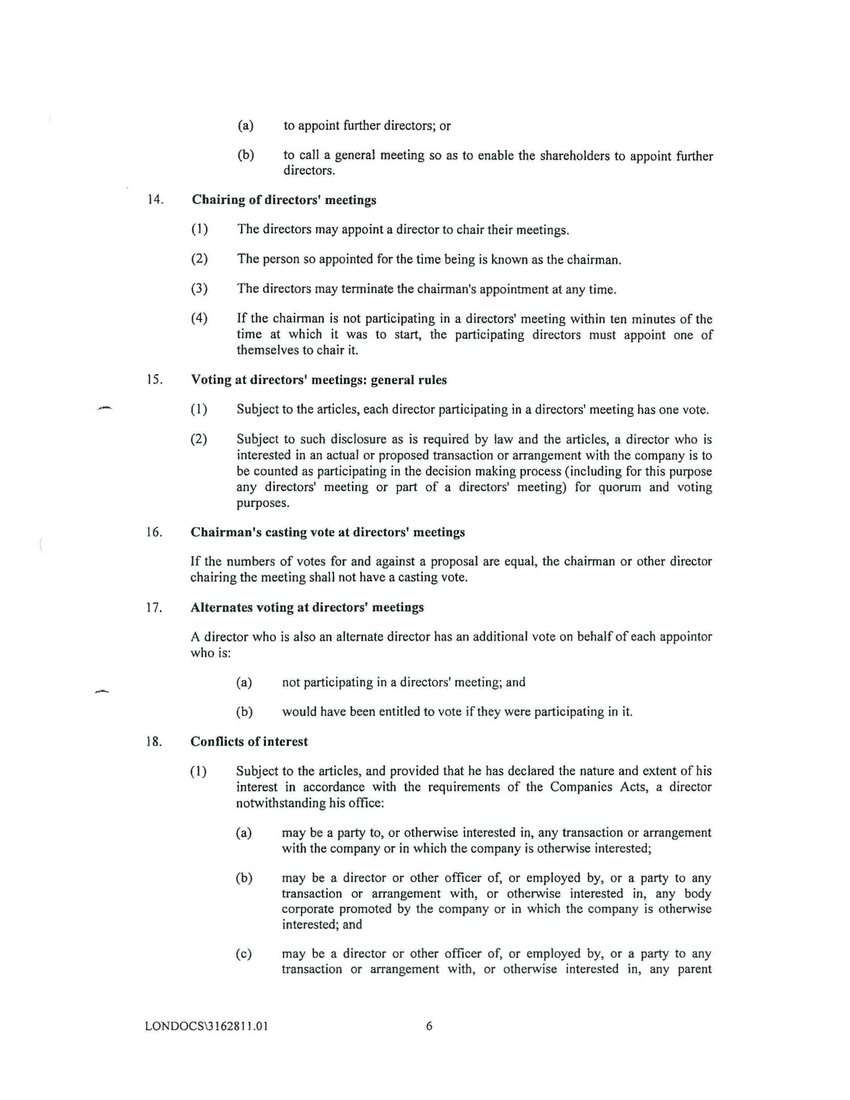 | to appoint further directors; or to call a general meeting so as to enable the shareholders to appoint further directors. Chairing of directors' meetings The directors may appoint a director to chair their meetings. The person so appointed for the time being is known as the chairman. The directors may tenninate the chainnan's appointment at any time. If the chairman is not participating in a directors' meeting within ten minutes of the time at which it was to start, the participating directors must appoint one of themselves to chair it. Voting at directors' meetings: general rules (I)Subject to the articles, each director participating in a directors' meeting has one vote. (2) Subject to such disclosure as is required by law and the articles, a director who is interested in an actual or proposed transaction or arrangement with the company is to be counted as participating in the decision making process (including for this purpose any directors' meeting or part of a directors' meeting) for quorum and voting purposes . Chairman's casting vote at directors' meetings If the numbers of votes for and against a proposal are equal, the chairman or other director chairing the meeting shall not have a casting vote. Alternates voting at directors' meetings A director who is also an alternate director has an additional vote on behalf of each appointor who is: not participating in a directors' meeting; and would have been entitled to vote if they were participating in it. Conflicts of interest Subject to the articles, and provided that he has declared the nature and extent of his interest in accordance with the requirements of the Companies Acts, a director notwithstanding his office: may be a party to, or otherwise interested in, any transaction or arrangement with the company or in which the company is otherwise interested; may be a director or other officer of, or employed by, or a party to any transaction or arrangement with, or otherwise interested in, any body corporate promoted by the company or in which the company is otherwise interested; and may be a director or other officer of, or employed by, or a party to any transaction or arrangement with, or otherwise interested in, any parent |
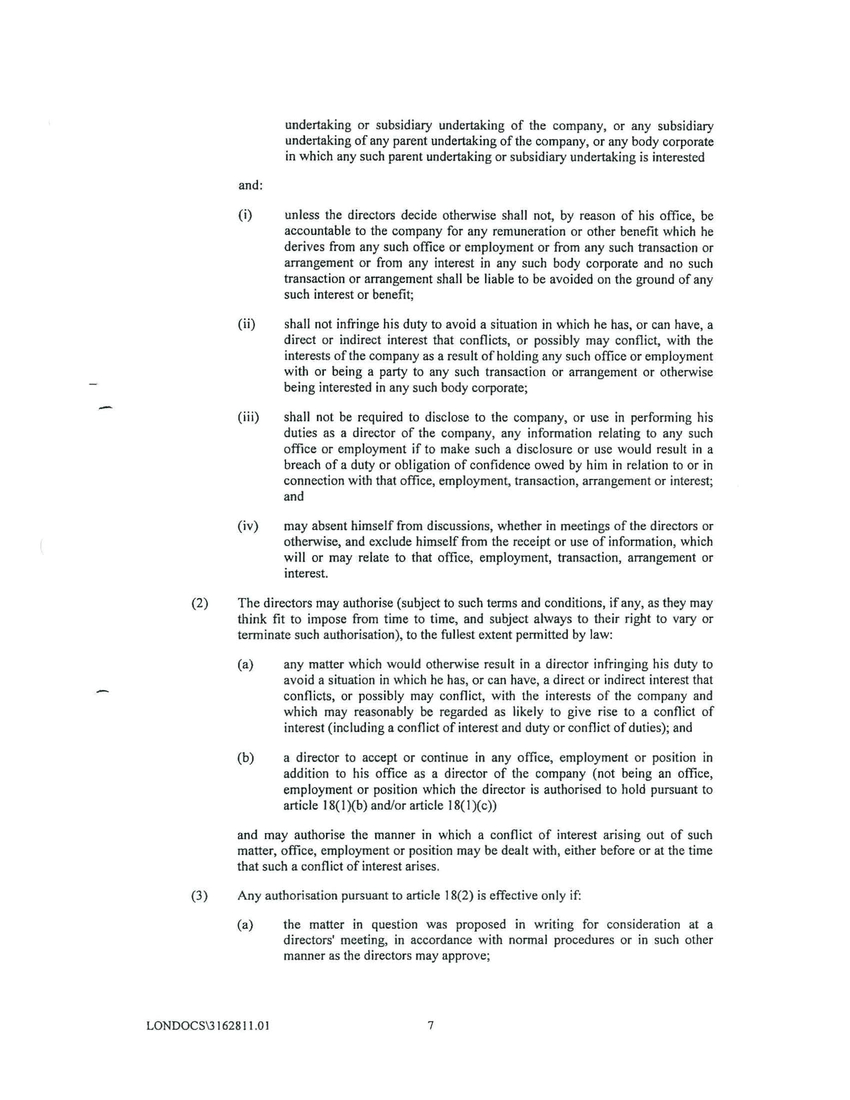 | undertaking or subsidiary undertaking of the company, or any subsidiary undertaking of any parent undertaking of the company, or any body corporate in which any such parent undertaking or subsidiary undertakin g is interested and: unless the directors decide otherwise shall not, by reason of his office, be accountable to the company for any remun eration or other benefit which he derives from any such office or employment or from any such transaction or arrangement or from any interest in any such body corporate and no such transaction or arrangement shall be liable to be avoided on the ground of any such interest or benefit; shall not infringe his duty to avoid a situation in which he has, or can have, a direct or indirect interest that conflicts, or possibly may conflict, with the interests of the company as a result of holding any such office or employment with or being a party to any such transaction or arrangem ent or otherwise being interested in any such body corporate; shall not be required to disclose to the company, or use in performing his duties as a director of the company, any informati on relating to any such office or employment if to make such a disclosure or use would result in a breach of a duty or obligation of confidence owed by him in relation to or in connection with that office, employment, transaction , arrangem ent or interest; and may absent himself from discussions, whether in meetings of the directors or otherwise, and exclude himself from the receipt or use of information, which will or may relate to that office, employment , transaction, arrangement or interest. The directors may authorise (subject to such terms and conditions, if any, as they may think fit to impose from time to time, and subject always to their right to vary or terminate such authorisation), to the fullest extent permitted by law: any matter which would otherwise result in a director infringing hi s duty to avoid a situation in which he has, or can have, a direct or indirect interest that conflicts, or possibly may conflict, with the interests of the company and which may reasonably be regarded as likely to give rise to a conflict of interest (including a conflict of interest and duty or conflict of duties); and a director to accept or continu e in any office, employment or position in addition to his office as a director of the compan y (not being an office, employment or position which the director is authorised to hold pursuant to article 18(1)(b) and/or article 18(1)(c)) and may authorise the manner in which a conflict of interest arising out of such matter, office, employment or position may be dealt with , either before or at the time that such a conflict of interest arises. Any authorisation pursu ant to article I 8(2) is effective only if: the matt er in question was proposed in writin g for consideration at a directors' meeting, in accordance with normal procedur es or in such other manner as the directors may approve ; |
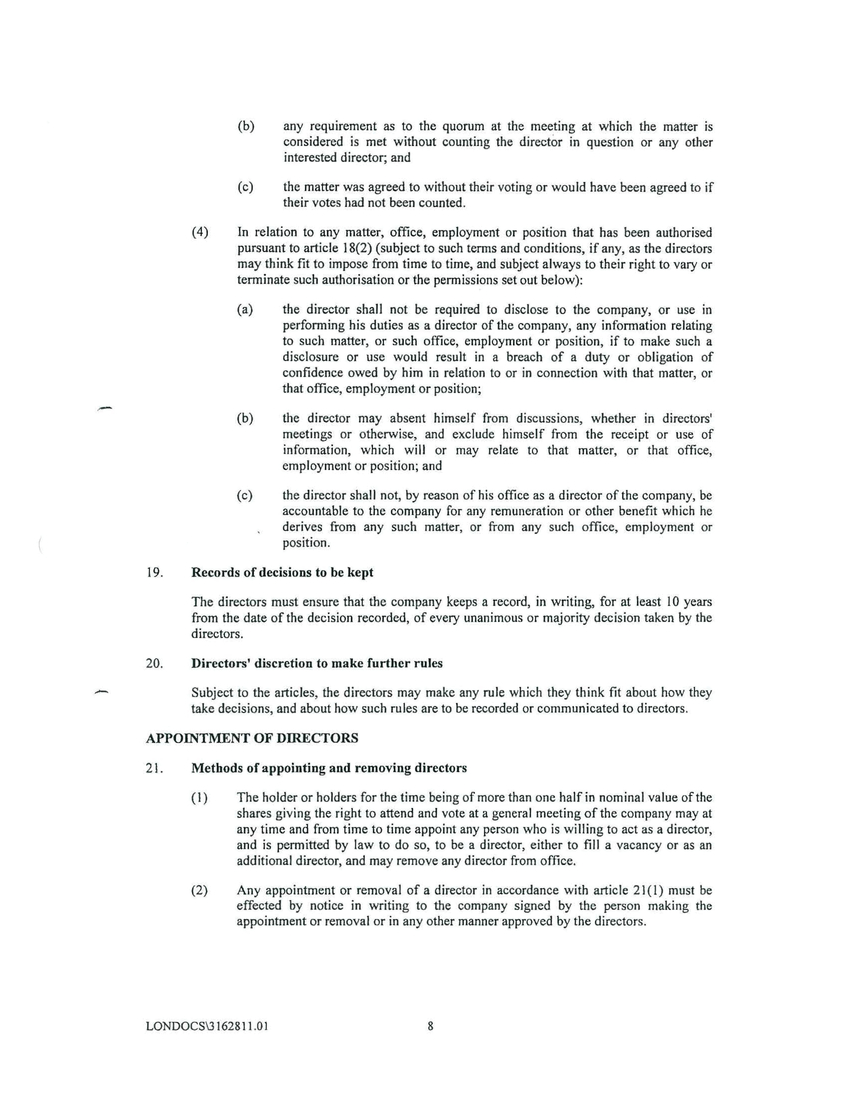 | any requirement as to the quorum at the meeting at which the matter is considered is met without counting the director in question or any other interested director; and the matter was agreed to without their voting or would have been agreed to if their votes had not been counted. In relation to any matter, office, employment or position that has been authorised pursuant to article 18(2) (subject to such terms and conditions, if any, as the directors may think fit to impose from time to time, and subject always to their right to vary or terminate such authorisation or the permissions set out below) : the director shall not be required to disclose to the company, or use in performing his duties as a director of the company, any informat ion relating to such matter, or such office, employment or position, if to make such a disclosure or use would result in a breach of a duty or obligation of confidence owed by him in relation to or in connection with that matter, or that office, employment or position; the director may absent himself from discussions, whether in directors' meetings or otherwise, and exclude himself from the receipt or use of information, which will or may relate to that matter, or that office, employment or position; and the director shall not, by reason of his office as a director of the company, be accountable to the company for any remuneration or other benefit which he derives from any such matter, or from any such office, employment or position. Records of decisions to be kept The directors must ensure that the company keeps a record, in writing, for at least I 0 years from the date of the decision recorded, of every unanimous or majority decision taken by the directors. Directors' discretion to make further rules Subject to the articles, the directors may make any rule which they think fit about how they take decisions, and about how such rules are to be recorded or communicated to directors. APPOINTMENT OF DIRECTORS Methods of appointing and removing directors The holder or holders for the time being of more than one half in nominal value of the shares giving the right to attend and vote at a general meeting of the company may at any time and from time to time appoint any person who is willing to act as a director, and is permitted by law to do so, to be a director, either to fill a vacancy or as an additional director, and may remove any director from office. (2) Any appointment or removal of a director in accordance with article 2 I (I) must be effected by notice in writing to the company signed by the person making the appointment or removal or in any other manner approved by the directors. |
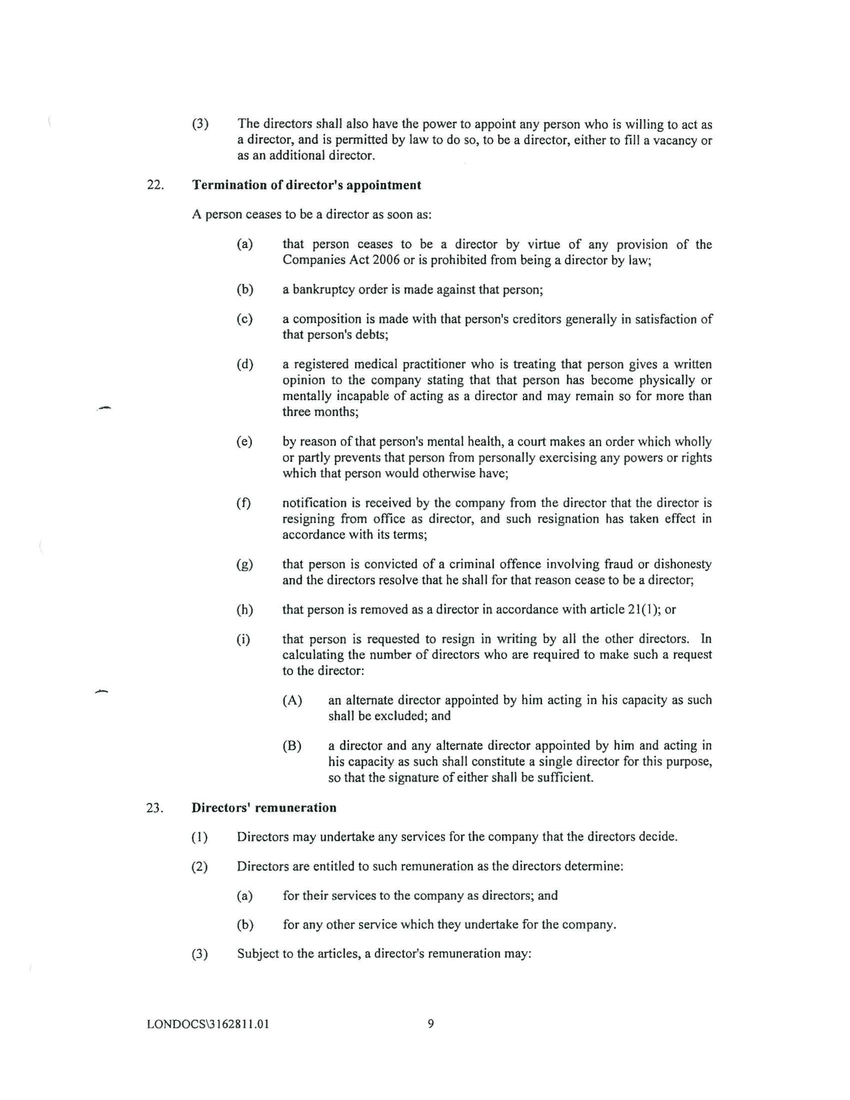 | (3) The directors shall also have the power to appoint any person who is willing to act as a director, and is pennitted by law to do so, to be a director, either to fill a vacancy or as an additional director. Termination of director's appointment A person ceases to be a director as soon as: that person ceases to be a director by virtue of any prov1s1on of the Companies Act 2006 or is prohibited from being a director by law; a bankruptcy order is made against that person; a composition is made with that person 's creditors generally in satisfaction of that person's debts; .-by reason of that person's mental health, a court makes an order which wholly or partly prevents that person from personally exercising any powers or rights which that person would otherwise have; (t) notification is received by the company from the director that the director is resigning from office as director, and such resignation has taken effect in accordance with its terms; that person is convicted of a criminal offence involving fraud or dishonesty and the directors resolve that he shall for that reason cease to be a director; that person is removed as a director in accordance with article 21(1); or that person is requested to resign in writing by all the other directors. In calculating the number of directors who are required to make such a request to the director: an alternate director appointed by him acting in his capacity as such shall be excluded; and a director and any alternate director appointed by him and acting in his capacity as such shall constitute a single director for this purpose, so that the signature of either shall be sufficient. Directors' remuneration ( 1)Directors may undertake any services for the company that the directors decide. Directors are entitled to such remuneration as the directors determine: for their services to the company as directors; and for any other service which they undertake for the company. Subject to the articles, a director's remuneration may: |
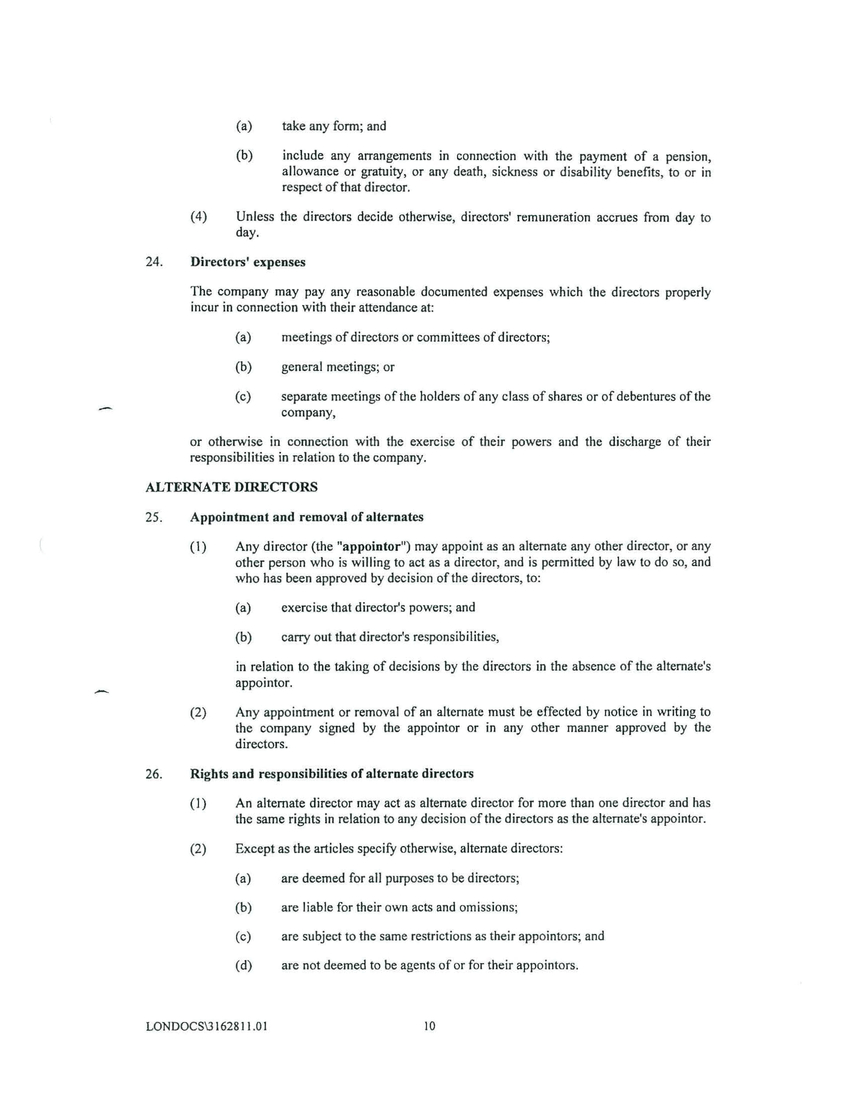 | take any form; and include any arrangements in connection with the payment of a pension, allowance or gratuity, or any death, sickness or disability benefits, to or in respect of that director . (4) Unless the directors decide otherwise, directors' remuneration accrues from day to day. Directors' expenses The company may pay any reasonable documented expenses wh ich the directors properly incur in connection with their attendance at: meetings of directors or committees of directors; general meetings; or separate meetings of the holders of any class of shares or of debentures of the company, or otherwise in connection with the exercise of their powers and the discharge of their responsibilities in relation to the company. ALTERNATE DIRECTORS Appointment and removal of alternates (I ) Any director (the "appointor") may appoint as an alternate any other director, or any other person who is wi lling to act as a director, and is permitted by law to do so, and who has been approved by decision of the directors, to: exercise that director's powers; and carry out that director's responsibi lities, in relation to the taking of decisions by the directors in the absence of the alternate's appointor. (2) Any appointment or removal of an alternate must be effected by notice in writing to the company signed by the appointor or in any other manner approved by the directors. Rights and responsibilities of alternate directors (J) An alternate director may act as alternate director for more than one director and has the same rights in relation to any decision of the directors as the alternate's appointor. Except as the articles specify otherwise, alternate directors: are deemed for all purposes to be directors; are liable for their own acts and omissions; are subject to the same restrictions as their appointors; and are not deemed to be agents of or for their appointers. |
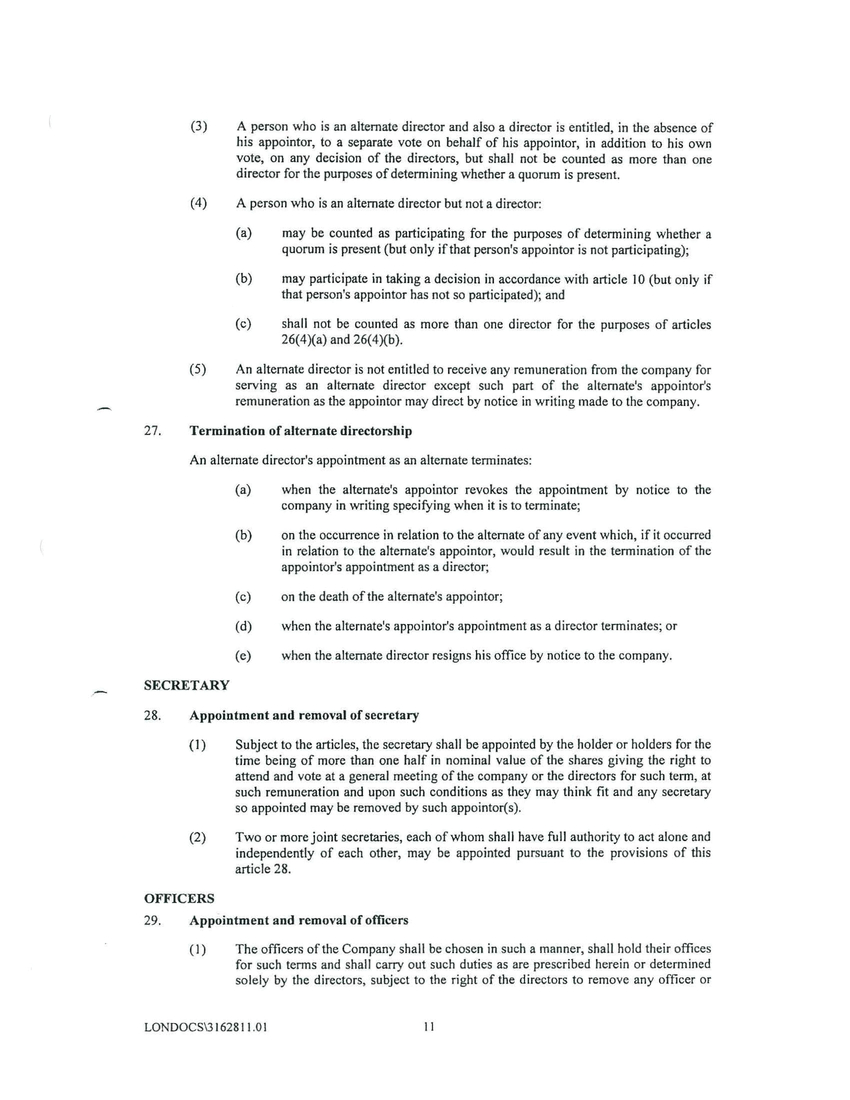 | A person who is an alternate director and also a director is entitled, in the absence of his appointor, to a separate vote on behalf of his appointor, in addition to his own vote, on any decision of the directors, but shall not be counted as more than one director for the purposes of determining whether a quorum is present. A person who is an alternate director but not a director: may be counted as participating for the purposes of determining whether a quorum is present (but only ifthat person's appointor is not participating); may participate in taking a decision in accordance with article JO (but only if that person's appointor has not so participated); and shall not be counted as more than one director for the purposes of articles 26(4)(a) and 26(4)(b). An alternate director is not entitled to receive any remuneration from the company for serving as an alternate director except such part of the alternate's appointor's remuneration as the appointor may direct by notice in writing made to the company. Termination of alternate directorship An alternate director's appointment as an alternate terminates: when the alternate's appointor revokes the appointment by notice to the company in writing specifying when it is to terminate; on the occurrence in relation to the alternate of any event which , if it occurred in relation to the alternate's appointor, would result in the termination of the appointor's appointment as a director; on the death of the alternate's appointor; when the alternate's appointor's appointment as a director terminates; or when the alternate director resigns his office by notice to the company. SECRETARY Appointment and removal of secretary (I) Subject to the articles, the secretary shall be appointed by the holder or holders for the time being of more than one half in nominal value of the shares giving the right to attend and vote at a general meeting of the company or the directors for such tenn, at such remuneration and upon such conditions as they may think fit and any secretary so appointed may be removed by such appointor(s). (2) Two or more joint secretaries, each of whom shall have full authority to act alone and independently of each other, may be appointed pursuant to the provisions of this article 28. OFFICERS Appointment and removal of officers (I) The officers of the Company shall be chosen in such a manner, shall hold their offices for such terms and shall carry out such duties as are prescribed herein or determined solely by the directors, subject to the right of the directors to remove any officer or |
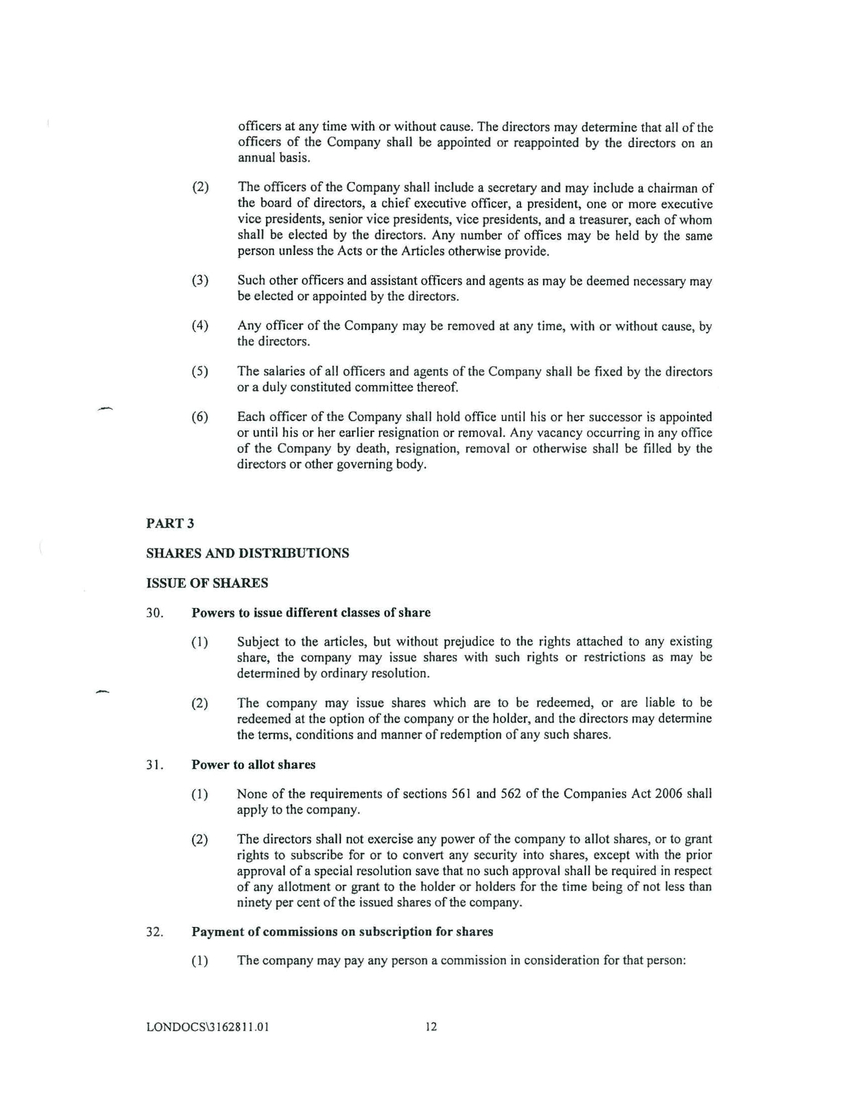 | officers at any time with or without cause. The directors may determine that all of the officers of the Company shall be appointed or reappointed by the directors on an annual basis. The officers of the Company shall include a secretary and may include a chairman of the board of directors, a chief executive officer, a president, one or more executive vice presidents, senior vice presidents, vice presidents, and a treasurer, each of whom shall be elected by the directors. Any number of offices may be held by the same person unless the Acts or the Articles otherwise provide. Such other officers and assistant officers and agents as may be deemed necessary may be elected or appointed by the directors. Any officer of the Company may be removed at any time, with or without cause, by the directors. The salaries of all officers and agents of the Company shall be fixed by the directors or a duly constituted committee thereof. Each officer of the Company shall hold office until his or her successor is appointed or until his or her earlier resignation or removal. Any vacancy occurring in any office of the Company by death, resignation, removal or otherwise shall be filled by the directors or other governing body. PART3 SHARES AND DISTRIBUTIONS ISSUE OF SHARES Powers to issue different classes of share (I) Subject to the articles, but without prejudice to the rights attached to any existing share, the company may issue shares with such rights or restrictions as may be determined by ordinary resolution . (2) The company may issue shares which are to be redeemed, or are liable to be redeemed at the option of the company or the holder, and the directors may determine the terms, conditions and manner of redemption of any such shares. 3 I .Power to allot shares (1)None of the requirements of sections 561 and 562 of the Companies Act 2006 shall apply to the company. The directors shall not exercise any power of the company to allot shares, or to grant rights to subscribe for or to convert any security into shares, except with the prior approval of a special resolution save that no such approval shall be required in respect of any allotment or grant to the holder or holders for the time being of not less than ninety per cent of the issued shares of the company. Payment of commissions on subscription for shares The company may pay any person a commission in consideration for that person: |
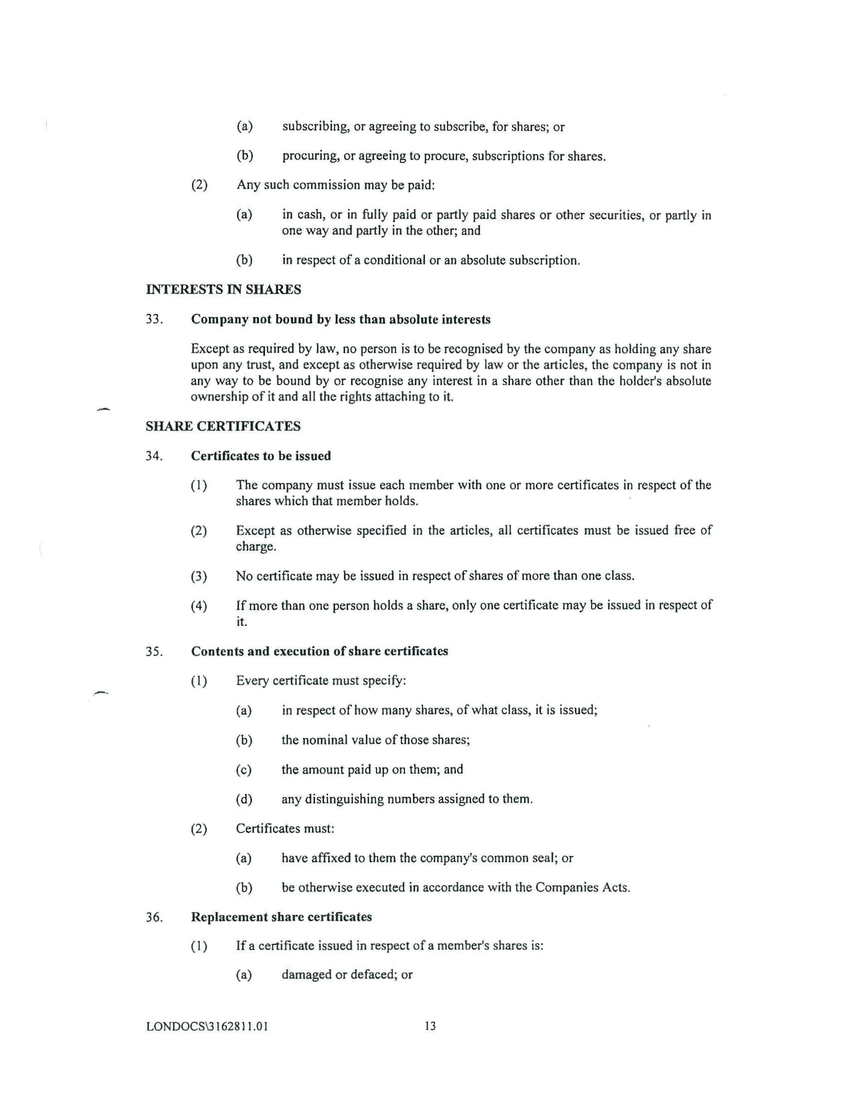 | subscribing, or agreeing to subscribe, for shares; or procuring, or agreeing to procure, subscriptions for shares. Any such commission may be paid: in cash , or in fully paid or partly paid shares or other securities, or part ly in one way and partly in the other; and in respect of a conditional or an absolute subscription. INTERESTS IN SHARES Company not bound by less than absolute interests Except as required by law, no person is to be recognised by the company as h oldin g any share upon any trust, and except as otherw ise requ ired by law or the articles, the company is not in any way to be bound by or recogni se any interest in a share other than the holder's absolute ownership of it and all the rights attaching to it. SHARE CERTIFICATES Certificates to be issued The company must issue each member with one or mor e certificates in respect of the shares which that member holds. Except as otherwise specified in the articles, all certificates must be issued free of charge. No certificate may be issued in respect of shares of more than one class. If more than one person holds a share, only one certificate may be issued in respect of it. Contents and execution of share certificates .-· Every certificate must specify: in respect of how many shares, of what class, it is issued; the nom inal value of those shares; the amount paid up on them; and any di stinguishing numbers assigned to them. Certificates mu st: have affixed to them the company's common seal; or be otherwise executed in accordance with the Companies Acts. Replacement share certificates ( I )If a certificate issued in respect of a member's shares is: damaged or defaced ; or |
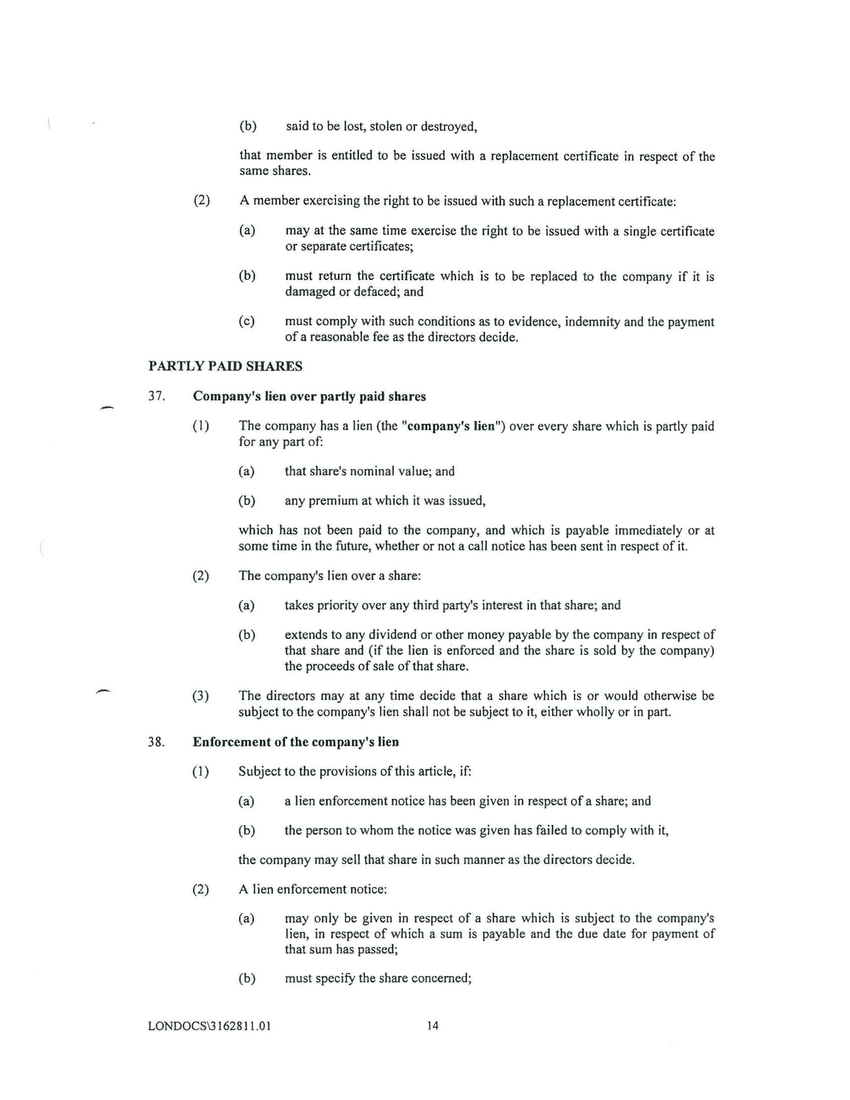 | said to be lost, stolen or destroyed, that member is entitled to be issued with a replacement certificate in respect of the same shares. A member exercising the right to be issued with such a replacement certificate : may at the same time exercise the right to be issued with a single certificate or separate certificates; must return the certificate which is to be replaced to the company if it is damaged or defaced; and must comply with such conditions as to evidence, indemnity and the payment of a reasonable fee as the directors decide. PARTLY PAID SHARES Company's lien over partly paid shares Th e company ha s a lien (the "company's lien") over every share which is partly paid for any part of: that share's nom inal value; and any premium at which it was issued, which has not been paid to the company, and which is payable immediately or at some time in the future, whether or not a call notice has been sent in respect of it. The company's lien over a share: takes priority over any third party's interest in that share; and extends to any dividend or other money payable by the company in respect of that share and (if the lien is enforced and the share is sold by the company) the proceeds of sale of that share. (3)The directors may at any time decide that a share which is or would otherwise be subject to the company's lien shall not be subject to it, either wholly or in part. Enforcement of the company's lien Subject to the provisions of this article, if: a lien enforcement notice has been given in respect of a share; and the person to whom the notice was given has failed to comply with it, the company may sell that share in such manner as the directors decide. A lien enforcement notice: may only be given in respect of a share which is subject to the company's lien, in respect of which a sum is payable and the due date for payment of that sum has passed; must specify the share concerned; |
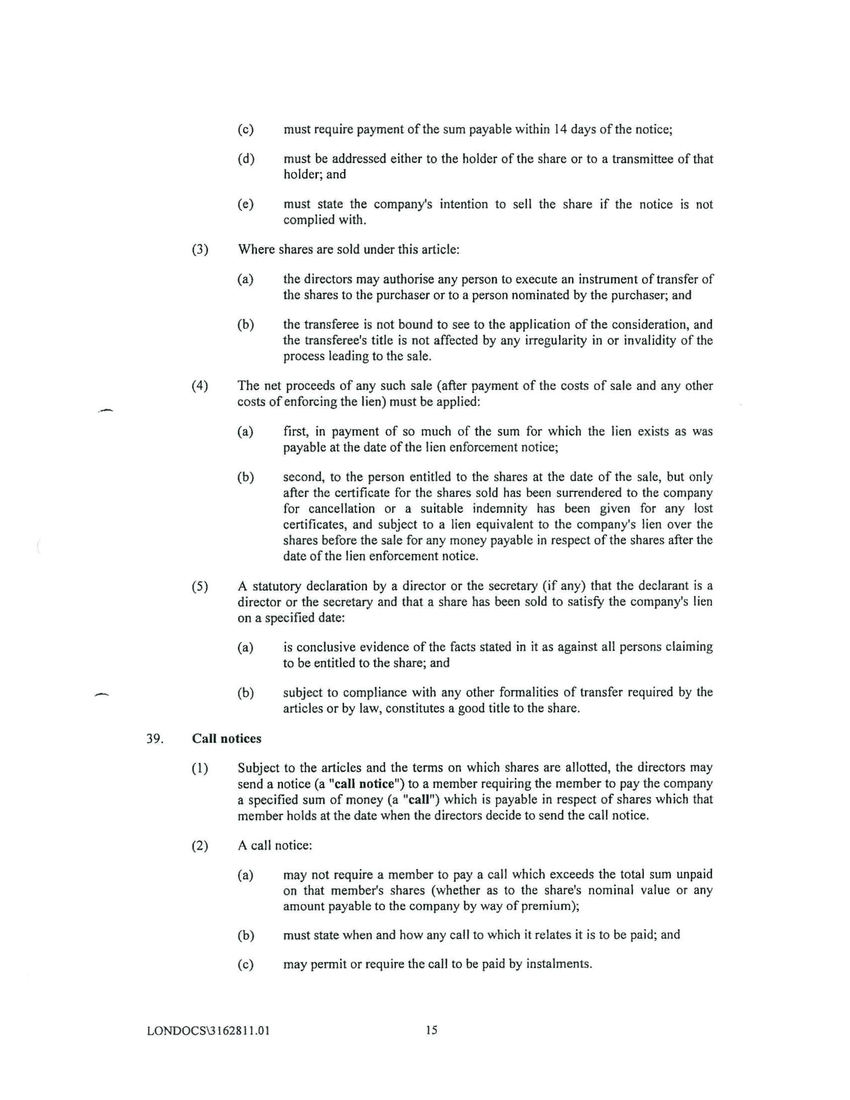 | must require payment of the sum payable within 14 days of the notice; must be addressed either to the holder of the share or to a transmittee of that holder ; and must state the company's intention to sell the share if the notice is not complied with. Where shares are sold under this article: the directors may authorise any person to execute an instrument of transfer of the shares to the purchaser or to a person nominated by the purchaser; and the transferee is not bound to see to the application of the consideration, and the transferee's title is not affected by any irregularity in or invalidity of the process leading to the sale. The net proceeds of any such sale (after payment of the costs of sale and any other costs of enforcing the lien) must be applied: first, in payment of so much of the sum for which the lien exists as was payable at the date of the lien enforcement notice; second, to the person entitled to the shares at the date of the sale, but only after the certificate for the shares sold has been surrendered to the company for cancellation or a suitable indemnity has been given for any lost certificates, and subject to a lien equiva lent to the company's lien over the shares before the sale for any money payable in respect of the shares after the date of the lien enforcement notice. A statutory declaration by a director or the secretary (if any) that the decl aran t is a director or the secretary and that a share has been sold to satisfy the company's lien on a specified date: is conclusiv e evidence of the facts stated in it as against all persons claiming to be entitled to the share; and subject to compliance with any other formalities of transfer required by the articles or by law, constitutes a good title to the share. Call notices Subject to the articles and the terms on which shares are allotted, the directors may send a notice (a "call notice") to a member requiring the member to pay the company a specified sum of money (a "call") which is payable in respect of shares which that member holds at the date when the directors decide to send the call notice . A call notice : may not require a member to pay a call which exceeds the total sum unpaid on that member's shares (whether as to the share's nominal value or any amount payable to the company by way of premium); must state when and how any call to wh ich it relates it is to be paid; and may permit or require the call to be paid by instalments. |
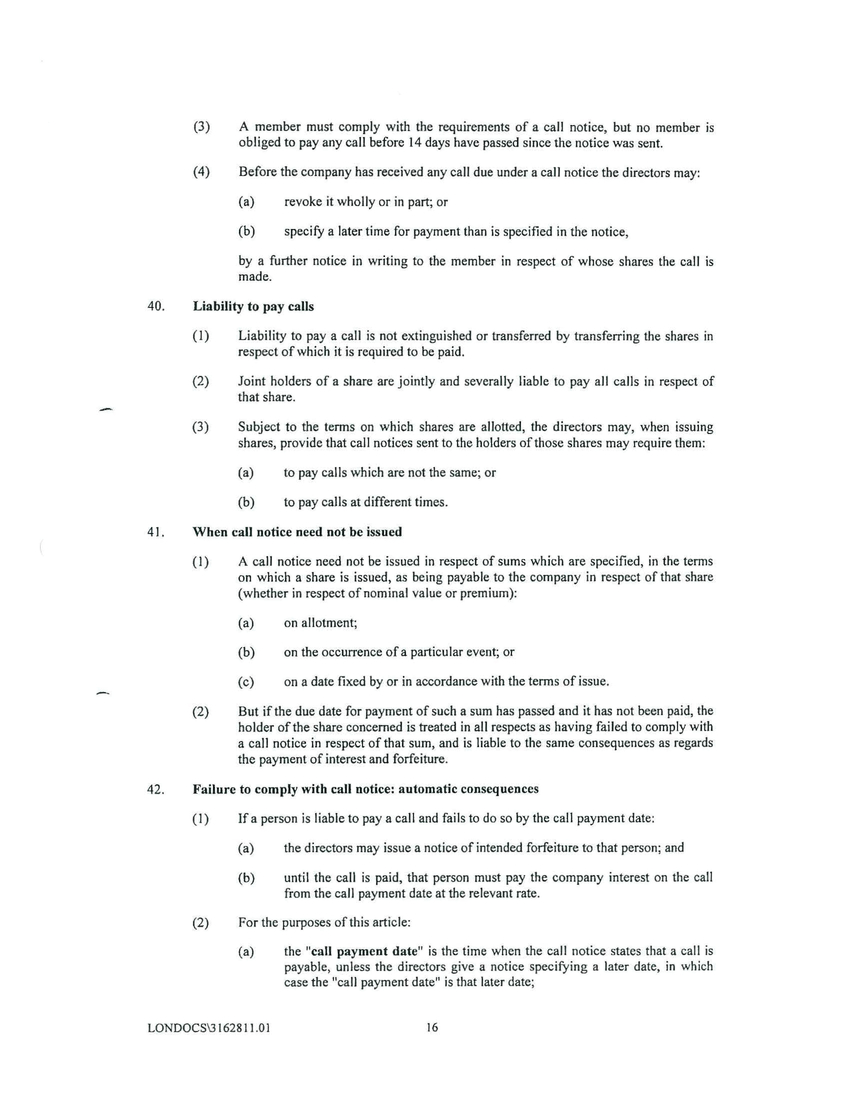 | A member mu st comply with the requirements of a call notice, but no member is obliged to pay any call before 14 days have passed since the notice was sent. Before the company has received any call due under a call notice the directors may : revoke it wholly or in part; or specify a later time for payment than is specified in the notice, by a further notice in writing to the member in respect of whose shares the call is made. Liability to pay calls (I) Liability to pay a call is not extinguished or tran sferred by transferring the shares in respect of which it is required to be paid. Joint holders of a share are jointly and severally liable to pay all calls in respect of that share. Subject to the terms on which shares are allotted, the directors may, when issuing shares, provid e that call notices sent to the holders of those shares may require them: to pay calls which are not the same; or to pay calls at different times. When call notice need not be issued A call notice need not be issued in respect of sums which are specified, in the tenns on which a share is issued, as being payable to the company in respect of that share (whether in respect of nominal value or premium): on allotment; on the occurrence ofa particular event; or on a date fixed by or in accordance with the term s of issue. (2) But if the due date for payment of such a sum has passed and it has not been paid, the holder of the share concerned is treated in all respects as having failed to comply with a call notice in respect of that sum, and is liable to the same consequences as regards the payment of interest and forfeiture. Failure to comply with call notice: automatic consequences If a person is liable to pay a call and fails to do so by the call payment date: the directors may issue a noti ce of intended forfeiture to that person; and until the call is paid, that person must pay the company interest on the call from the call payment date at the relevant rate. For the purpo ses of this article: the "call payment date" is the time when the call notice states that a call is payable, unless the directors give a notice specifying a later date, in which case the "call payment date" is that later date; |
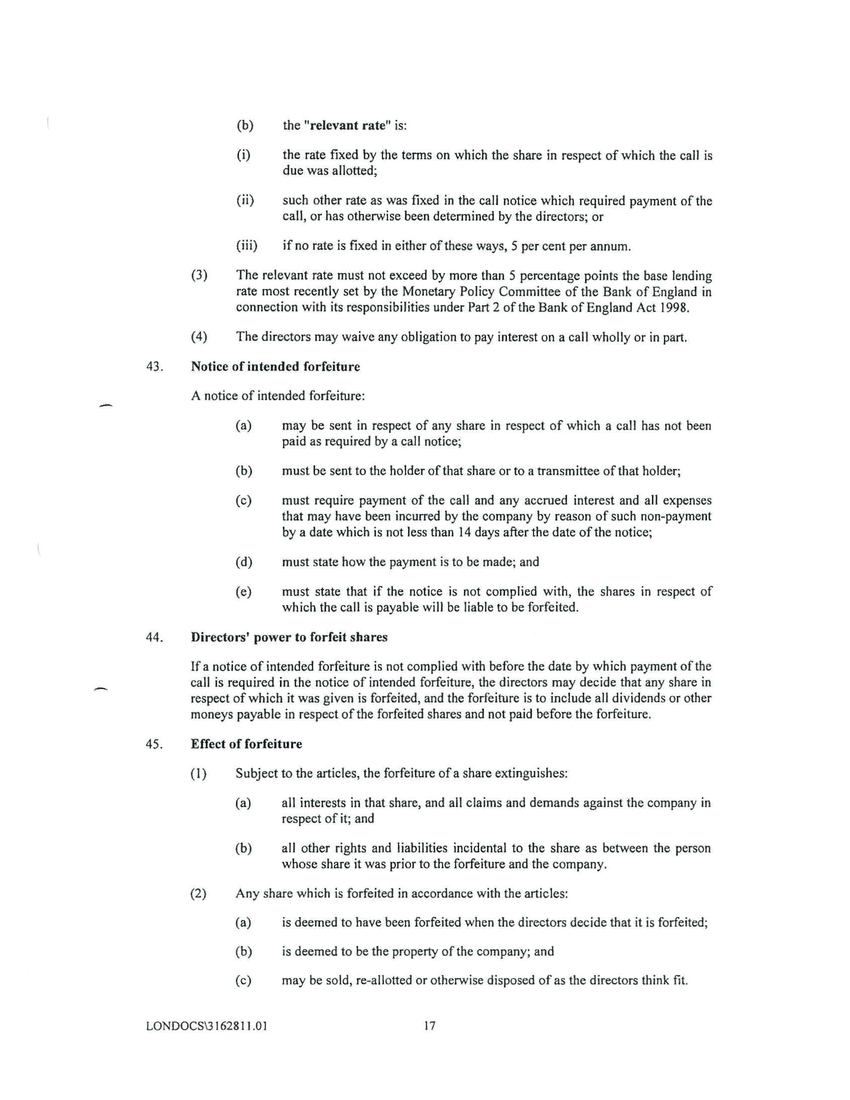 | the "relevant rate" is: the rate fixed by the tenns on which the share in respect of wh ich the call is due was allotted; such other rate as was fixed in the call notice which required payment of the call, or has otherwise been determined by the directors; or if no rate is fixed in either of these ways, 5 per cent per annum. The relevant rate must not exceed by more than 5 percentage points the base lendin g rate most recently set by the Monetary Policy Committee of the Ban k of England in connection with its respon sibilities under Part 2 of the Bank of England Act 1998. The directors may waive any obligati on to pay interest on a call wholly or in part. Notice of intended forfeiture A notice of intended forfeiture: may be sent in respect of any share in respect of which a call has not been paid as required by a call notice; must be sent to the holder of that share or to a transmittee of that holder; must require payment of the call and any accrued interest and a ll expenses that may have been incurred by the company by reason of such non-paym ent by a date which is not less than 14 days after the date of the notice; mu st state how the payment is to be made; and must state that if the notice is not complied with, the shares in respect of which the call is payable wi ll be liable to be forfeited. Directors' power to forfeit shares If a notice of intended forfeiture is not complied with before the date by which payment of the call is required in the notice of intended forfeiture, the directors may decide that any share in respect of wh ich it was given is forfeited, and the forfeiture is to include all dividends or other moneys payable in respect of the forfeited shares and not paid before the forfeiture. Effect of forfeiture Subject to the articles, the forfeiture of a share extinguishes: all interests in that share, and all claims and demands against the company in respect of it; and all other rights and liabilities incidental to the share as between the person whose share it was prior to the forfeiture and the company. Any share which is forfeited in accordance with the articles: is deemed to have been forfeited when the d irectors decide that it is forfeited; is deemed to be the property of the company; and m ay be sold, re-allotted or otherwise disposed of as the directors think fit. |
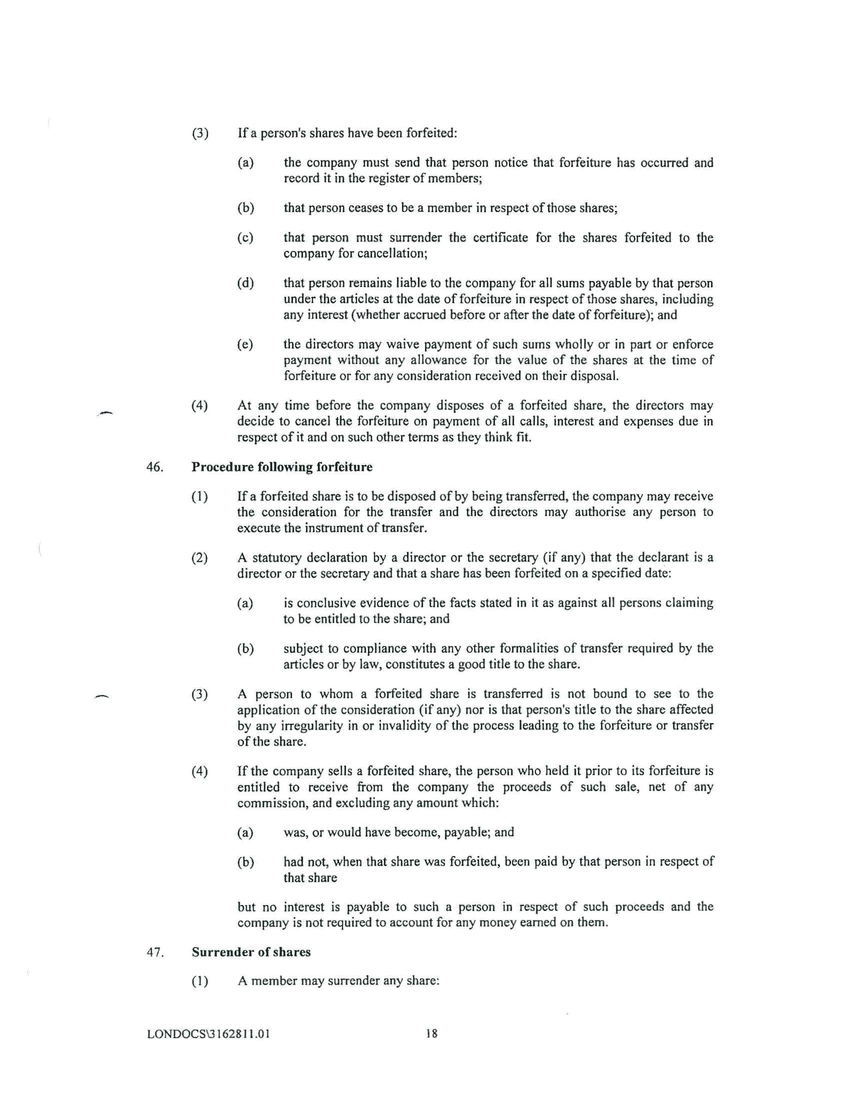 | If a person's shares have been forfeited: the company must send that person notice that forfeiture has occurred and record it in the register of members; that person ceases to be a member in respect of those shares; that person must surrender the certificate for the shares forfeited to the company for cancellation; that person remains liable to the company for all sums payable by that person under the articles at the date of forfeiture in respect of those shares, including any interest (whether accrued before or after the date of forfeiture); and the directors may waive payment of such sums wholly or in part or enforce payment without any allowance for the value of the shares at the time of forfeiture or for any consideration received on their disposal. .-Procedure fo11owing forfeiture Ifa forfeited share is to be disposed of by being transferred, the company may receive the consideration for the transfer and the directors may authorise any person to execute the instrument of transfer. A statutory declaration by a director or the secretary (if any) that the declarant is a director or the secretary and that a share has been forfeited on a specified date: is conclusive evidence of the facts stated in it as against all persons claiming to be entitled to the share; and subject to compliance with any other formalities of transfer required by the articles or by law, constitutes a good title to the share. A person to whom a forfeited share is transferred is not bound to see to the application of the consideration (if any) nor is that person's title to the share affected by any irregularity in or invalidity of the process leading to the forfeiture or transfer of the share. If the company sells a forfeited share, the person who held it prior to its forfeiture is entitled to receive from the company the proceeds of such sale, net of any commission, and excluding any amount which: was, or would have become, payable; and had not, when that share was forfeited, been paid by that person in respect of that share but no interest is payable to such a person in respect of such proceeds and the company is not required to account for any money earned on them . Surrender of shares A member may surrender any share: |
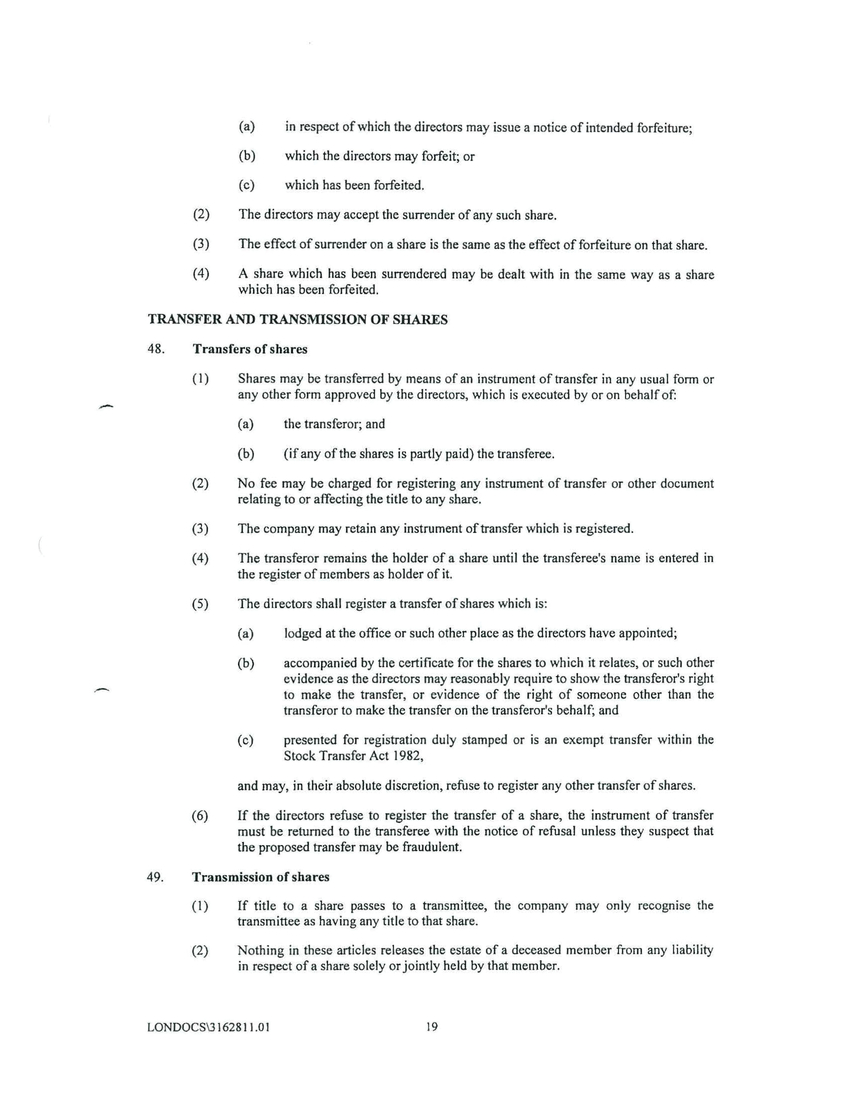 | in respect of which the directors may issue a notice of intended forfeiture; which the directors may forfeit; or which has been forfeited. The directors may accept the surrender of any such share. The effect of surrender on a share is the same as the effect of forfeiture on that share. A share which has been surrendered may be dealt with in the same way as a share which has been forfeited. TRANSFER AND TRANSMISSION OF SHARES Transfers of shares - the transferor; and (if any of the shares is partly paid) the transferee. No fee may be charged for registering any instrument of transfer or other document relating to or affecting the title to any share. The company may retain any instrument of transfer which is registered. The transferor remains the holder of a share until the transferee's name is entered in the register of members as holder of it. The directors shall register a transfer of shares which is: lodged at the office or such other place as the directors have appointed; accompanied by the certificate for the shares to which it relates, or such other evidence as the directors may reasonably require to show the transferor's right to make the transfer, or evidence of the right of someone other than the transferor to make the transfer on the transferor's behalf; and presented for registration duly stamped or is an exempt transfer within the Stock Transfer Act 1982, and may, in their absolute discretion, refuse to register any other transfer of shares. If the directors refuse to register the transfer of a share, the instrument of transfer must be returned to the transferee with the notice of refusal unless they suspect that the proposed transfer may be fraudulent. Transmission of shares If title to a share passes to a transmittee, the company may only recognise the transmittee as having any title to that share. (2) Nothing in these articles releases the estate of a deceased member from any liability in respect of a share solely or jointly held by that member. |
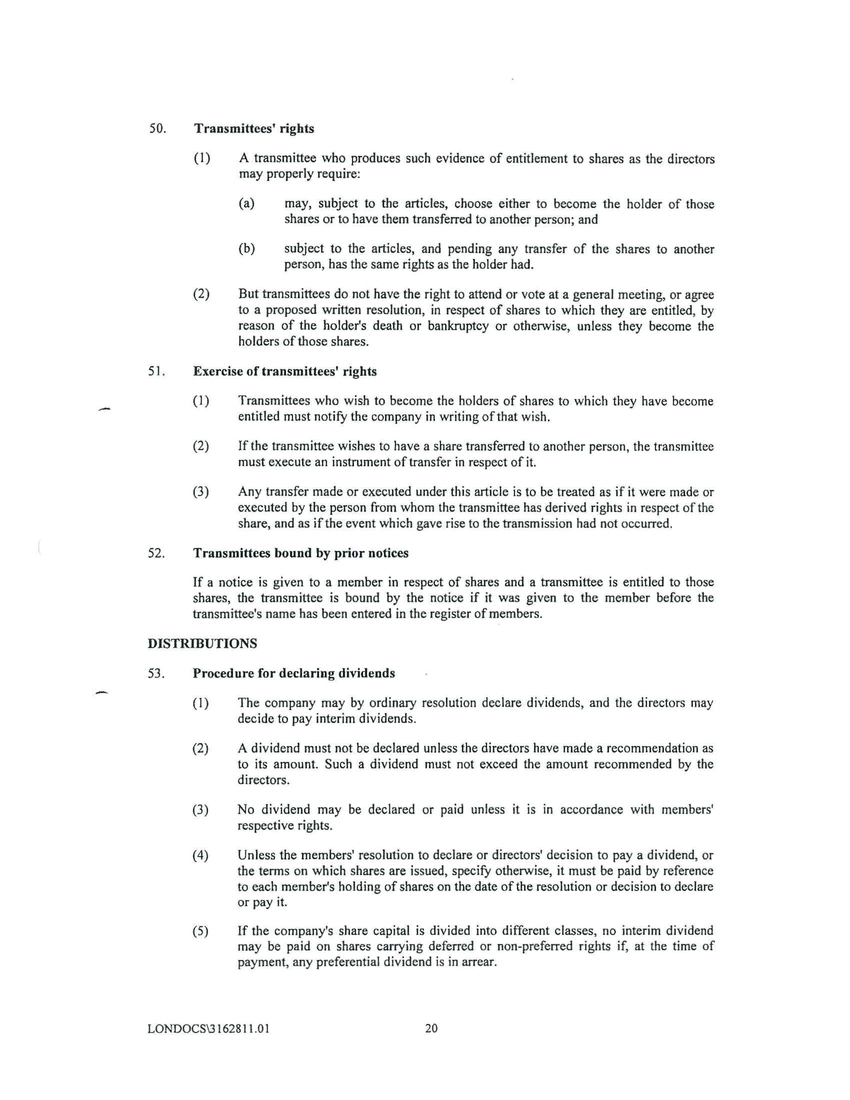 | Transmittees' rights A transmittee who produces such evidence of entitlement to shares as the directors may properly require: may, subject to the articles, choose either to become the holder of those shares or to have them transferred to another person; and subject to the articles, and pending any transfer of the shares to another person , has the same rights as the holder had. (2) But transmittees do not have the right to attend or vote at a general meeting, or agree to a proposed written resolution, in respect of shares to which they are entitled , by reason of the holder's death or bankruptcy or otherwise, unless they become the holders of those shares. Exercise of transmittees' rights Transmittees who wish to become the holders of shares to which they have become entitled must notify the company in writing of that wish. If the transmittee wishes to have a share transferred to another person, the transmittee must execute an instrument of transfer in respect of it. Any transfer made or executed under this article is to be treated as if it were made or executed by the person from whom the transmittee has derived rights in respect of the share, and as ifthe event which gave rise to the transmission had not occurred . Transmittees bound by prior notices If a notice is given to a member in respect of shares and a transmittee is entitled to those shares, the transmittee is bound by the notice if it was given to the member before the transmittee's name has been entered in the register of members. DISTRIBUTIONS Procedure for declaring dividends The company may by ordinary resolution declare dividends, and the directors may decide to pay interim dividends. A dividend must not be declared unless the directors have made a recommendation as to its amount . Such a dividend must not exceed the amount recommended by the directors. No dividend may be declared or paid unless it is m accordance with members' respective rights. Unless the members' resolution to declare or directors' decision to pay a dividend , or the terms on which shares are issued , specify otherwise, it must be paid by reference to each member's holding of shares on the date of the resolution or decision to declare or pay it. (S) If the company's share capital is divided into different classes, no interim dividend may be paid on shares carrying deferred or non-preferred rights if, at the time of payment, any preferential dividend is in arrear. |
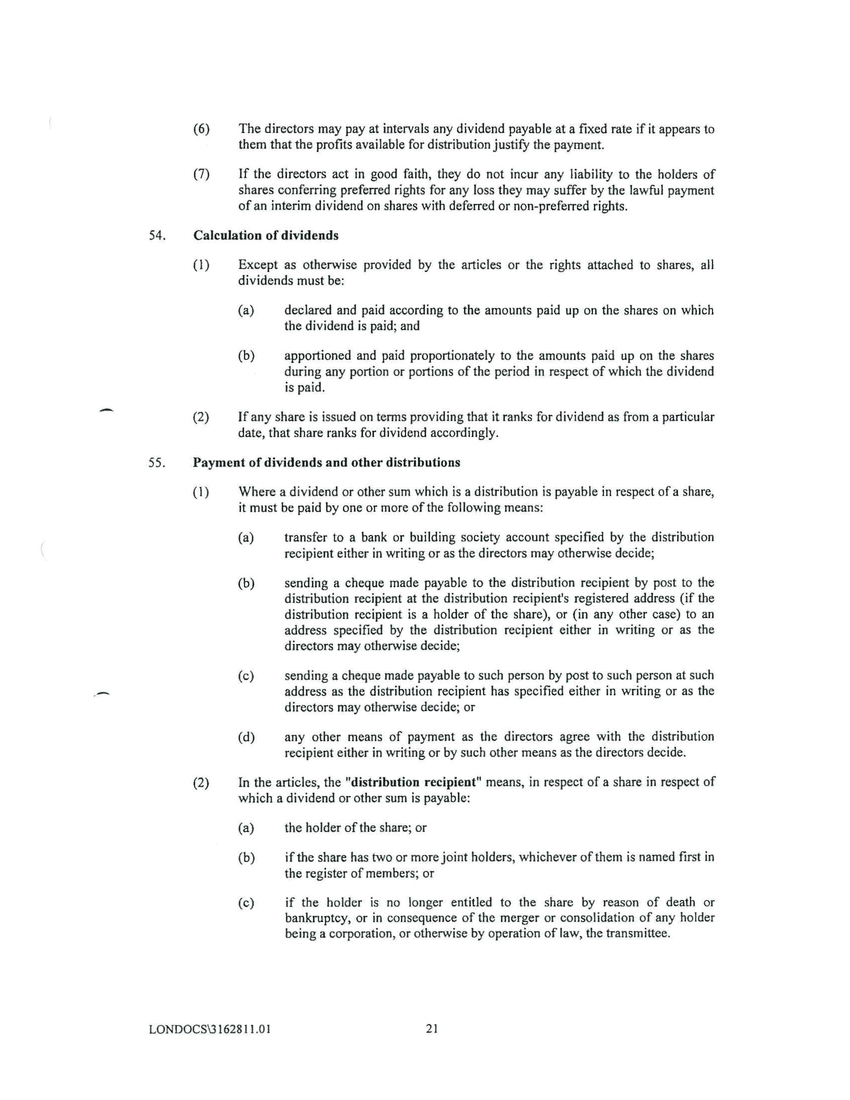 | The directors may pay at intervals any dividend payable at a fixed rate if it appears to them that the profits available for distribution just ify the paym ent. If the directors act in good faith, they do not incur any liability to the holders of shares conferring preferred rights for any loss they may suffer by the lawful payment of an interim dividend on shares with deferred or non-preferred rights. Calculation of dividends )Except as otherwi se provided by the articles or the rights attached to shares, all dividends must be : declared and paid according to the amounts paid up on the shares on which the dividend is paid; and apportioned and paid proportionately to the amounts paid up on the shares during any portion or portions of the period in respect of which the dividend is paid . If any share is issued on term s providing that it ranks for dividend as from a particular date, that share ranks for dividend accordingly . Payment of dividends and other distributions Where a dividend or other sum which is a distribution is payable in respect ofa share, it must be pa id by one or more of the following means: tran sfer to a bank or building society account specified by the distribution recipient either in writing or as the directors may otherwise decide; sending a cheque made payabl e to the distribution recipient by post to the distribution recipient at the distribution recipient's registered address (if the distribution recipi ent is a holder of the share), or (in any other case) to an address specified by the distribution recipient either in writing or as the directors may otherwi se decide; sending a cheque made payable to such person by post to such person at such address as the distribution recipient has specified either in writing or as the directors may otherwise decide; or any other mean s of payment as the directors agree with the distribution recipient either in wr iting or by such other means as the directors decide. In the articles, the "distribution recipient" mean s, in respect of a share in respect of which a dividend or other sum is payabl e: the holder of the share; or ifthe share has two or morejoint holders, whichever of them is nam ed first in the register of members; or if the holder is no longer entitled to the share by reason of death or bankruptcy, or in consequ ence of the merger or con solidation of any holder being a corporation , or otherwise by operation of law, the transmittee . |
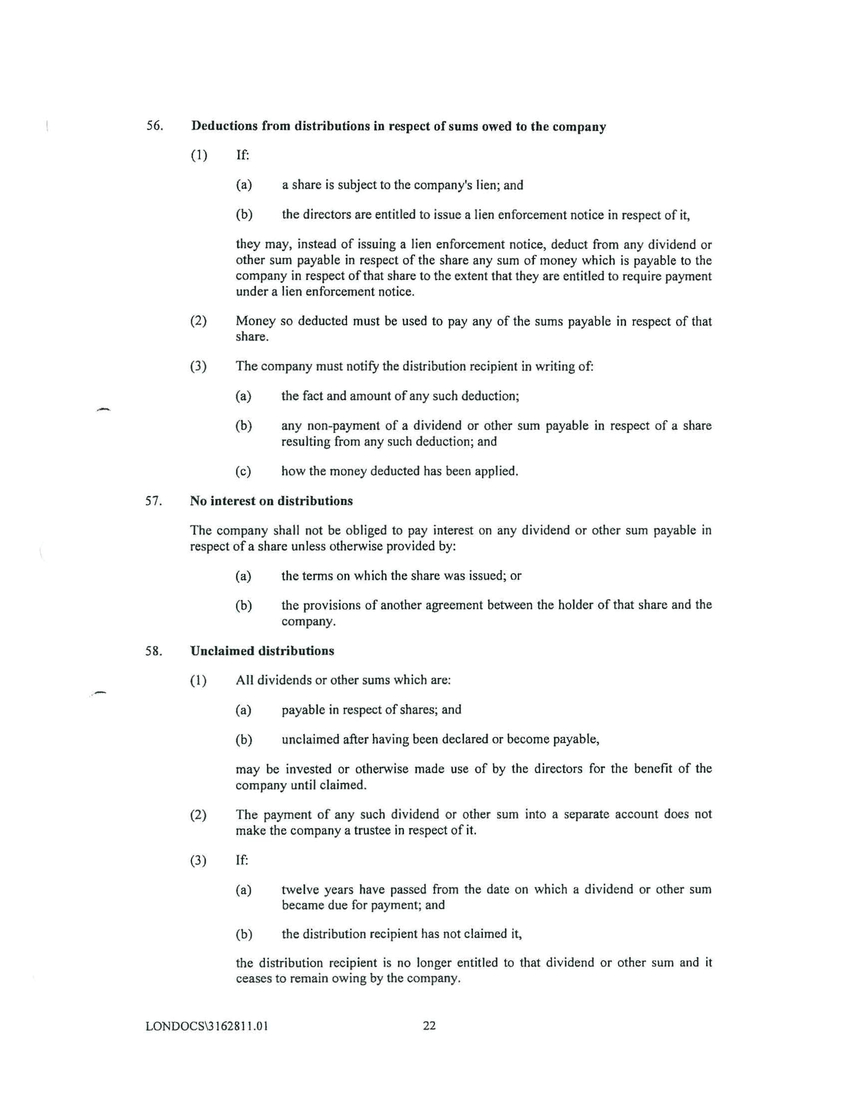 | Deductions from distributions in respect of sums owed to the company If: a share is subject to the company's lien; and the directors are entitled to issue a lien enforcement notice in respect of it, they may, instead of issuing a lien enforcement notice, deduct from any dividend or other sum payable in respect of the share any sum of money which is payable to the company in respect of that share to the extent that they are entitled to require payment under a lien enforcement notice. Money so deducted must be used to pay any of the sums payable in respect of that share. The company must notify the distribution recipient in writing of: the fact and amount of any such deduction; any non-payment of a dividend or other sum payable in respect of a share resulting from any such deduction; and how the money deducted has been applied. No interest on distributions The company shall not be obliged to pay interest on any dividend or other sum payable in respect of a share unless otherwise provided by: the term s on which the share was issued; or the provi sions of another agreement between the holder of that share and the company. Unclaimed distributions All dividends or other sums which are: payable in respect of shares; and unclaimed after having been declared or become payable, may be invested or otherwise made u se of by the directors for the benefit of the company until claimed. The payment of any such dividend or other sum into a separate account does not make the company a trustee in respect of it. If: twelve years have passed from the date on which a dividend or other sum became due for payment ; and the distribution recipient has not claimed it, the distribution recipient is no longer entitled to that dividend or other sum and it ceases to remain owing by the company. |
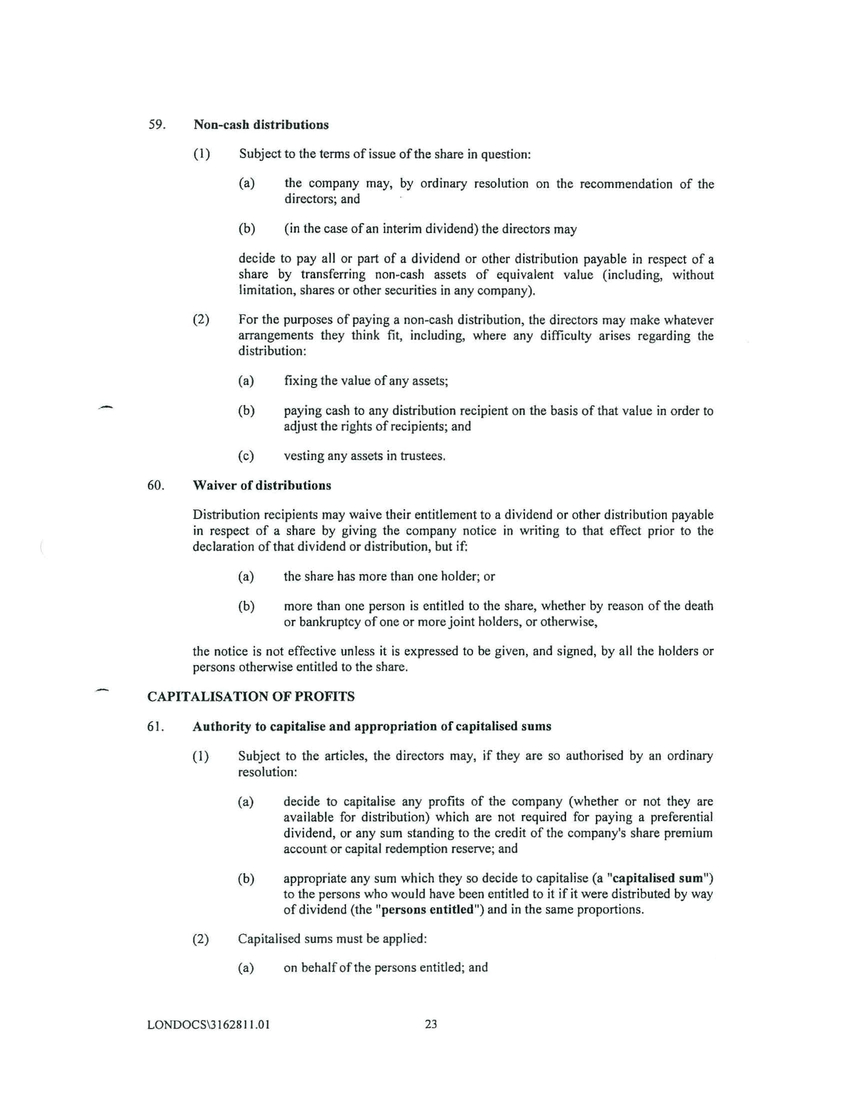 | Non-cash distributions Subject to the term s of issue of the share in question: the company may, by ordinary resolution on the recommendation of the directors; and (in the case of an interim dividend) the directors may decide to pay a ll or part of a dividend or other distribution payabl e in respect of a share by transferring non-cash assets of equivalent va lue (including, without limitation, shares or other securities in any company). For the purposes of paying a non-ca sh distribution, the directors may make whatever arrangements they thin k fit, including, where any difficulty arises regarding the distribution: fixing the value of any assets; paying cash to any distribution recipient on the basis of that value in order to adjust the rights of recipients ; and vesting any assets in trustees. Waiver of distributions Distribution recipients may waive their entitlement to a dividend or other distribution payable in respect of a share by giving the company notice in writing to that effect prior to the declaration of that dividend or distribution , but if: the share has more than one holder; or more than one person is entitled to the share, whether by reason of the death or bankruptcy of one or more joint holders, or otherwise, the notice is not effective unless it is expressed to be given, and signed, by all the holders or persons otherwise entitled to the share. CAPITALISATION OF PROFITS Authority to capitalise and appropriation of capitalised sums Subject to the articles, the directors may, if they are so authorised by an ordinary resolution : decide to capitali se any profits of the company (whether or not they are available for distribution) which are not required for paying a preferential dividend, or any sum standing to the credit of the company's share premium account or capital redemption reserve; and appropriate any sum which they so decide to capitalise (a "capitalised sum") to the persons who wou Id have been entitled to it if it were distributed by way of dividend (the "persons entitled") and in the same proportions. Capita lised sum s must be appl ied: on behalf of the persons entitled ; an d |
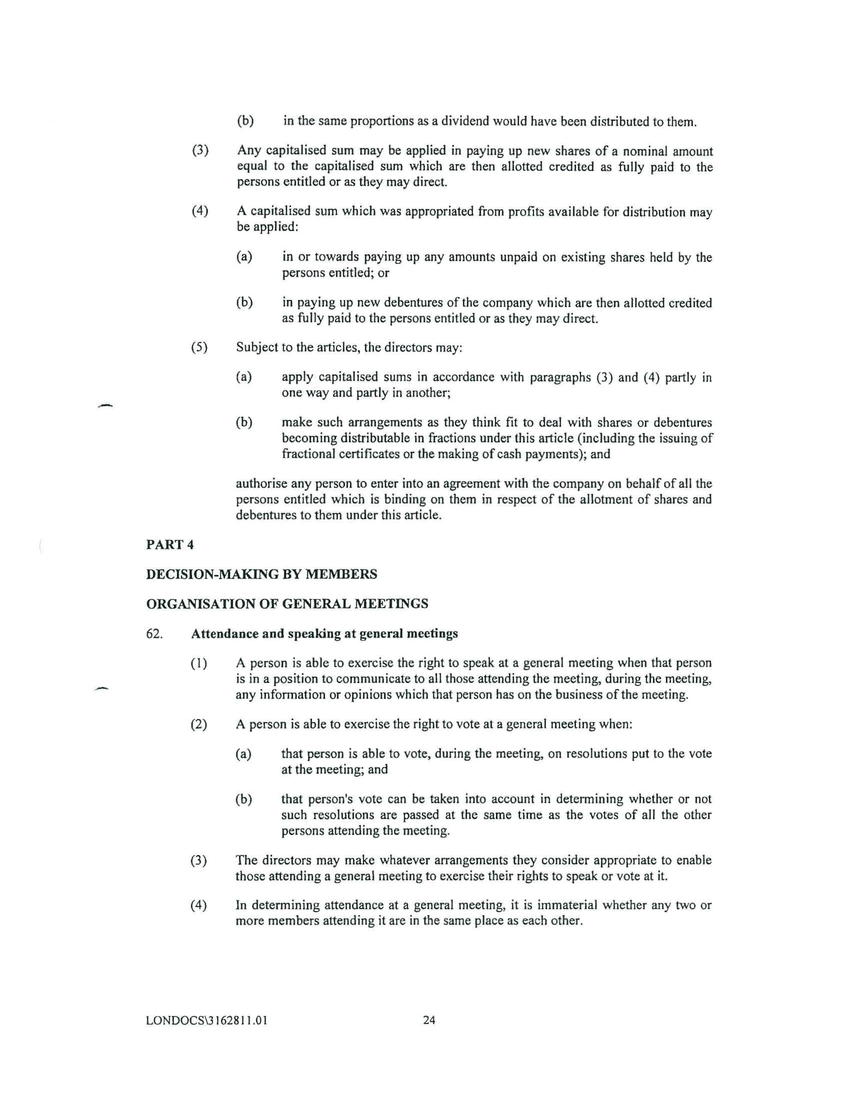 | in the same proportions as a dividend would have been distributed to them . Any capitalised sum may be applied in paying up new shares of a nominal amount equal to the capitalised sum which are then allotted credited as fully paid to the persons entitled or as they may direct. A capitalised sum which was appropriated from profits available for distribution may be applied: in or towards paying up any amounts unpaid on existing shares held by the persons entitled; or in paying up new debentures of the company which are then allotted credited as fully paid to the persons entitled or as they may direct. Subject to the articles, the directors may: apply capitalised sums in accordance with paragraphs (3) and (4) partly in one way and partly in another; make such arrangements as they think fit to deal with shares or debentures becoming distributable in fractions under this article (including the issuing of fractional certificates or the making of cash payments); and authorise any person to enter into an agreement with the company on behalf of all the persons entitled which is binding on them in respect of the allotment of shares and debentures to them under this article. PART4 DECISION-MAKING BY MEMBERS ORGANISATION OF GENERAL MEETINGS Attendance and speaking at general meetings A person is able to exercise the right to speak at a general meeting when that person is in a position to communicate to all those attending the meeting, during the meeting, any information or opinions which that person has on the business of the meeting. A person is able to exercise the right to vote at a general meeting when: that person is able to vote, during the meeting, on resolutions put to the vote at the meeting; and that person's vote can be taken into account in determining whether or not such resolutions are passed at the same time as the votes of all the other persons attending the meeting. The directors may make whatever arrangements they consider appropriate to enable those attending a general meeting to exercise their rights to speak or vote at it. ln determining attendance at a general meeting, it is immaterial whether any two or more members attending it are in the same place as each other. |
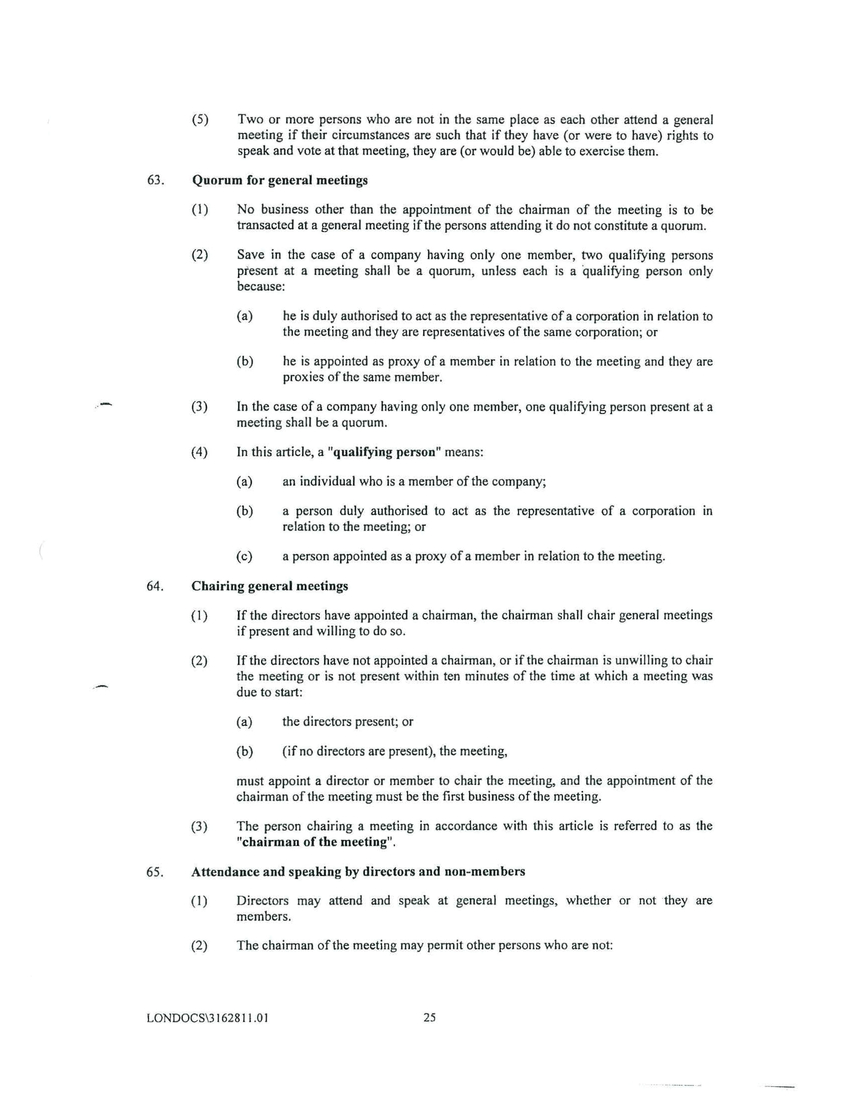 | Two or more persons who are not in the same place as each other attend a general meeting if their circumstances are such that if they have (or were to have) rights to speak and vote at that meeting, they are (or would be) able to exercise them. Quorum for general meetings No business other than the appointment of the chairman of the meeting is to be transacted at a general meeting if the persons attending it do not constitute a quorum. Save in the case of a company having only one member, two qualifying persons present at a meeting shall be a quorum, unless each is a 'qualifying person only because : he is duly authorised to act as the representative of a corporation in relation to the meeting and they are representatives of the same corporation; or he is appointed as proxy of a member in relation to the meeting and they are proxies of the same member. In the case of a company having only one member, one qualifying person present at a meeting shall be a quorum . In this article, a "qualifying person" means: an individual who is a member of the company; a person duly authorised to act as the representative of a corporation in relation to the meeting; or a person appointed as a proxy ofa member in relation to the meeting . Chairing general meetings If the directors have appointed a chairman, the chairman shall chair general meetings if present and willing to do so. If the directors have not appointed a chairman , or if the chairman is unwilling to chair the meeting or is not present within ten minutes of the time at which a meeting was due to start: the directors present; or (if no directors are present), the meeting, must appoint a director or member to chair the meeting, and the appointment of the chairman of the meeting must be the first business of the meeting . The person chairing a meeting in accordance with this article is referred to as the "chairman of the meeting". Attendance and speaking by directors and non-members Directors may attend and speak at general meetings, whether or not they are members. The chairman of the meeting may permit other persons who are not: |
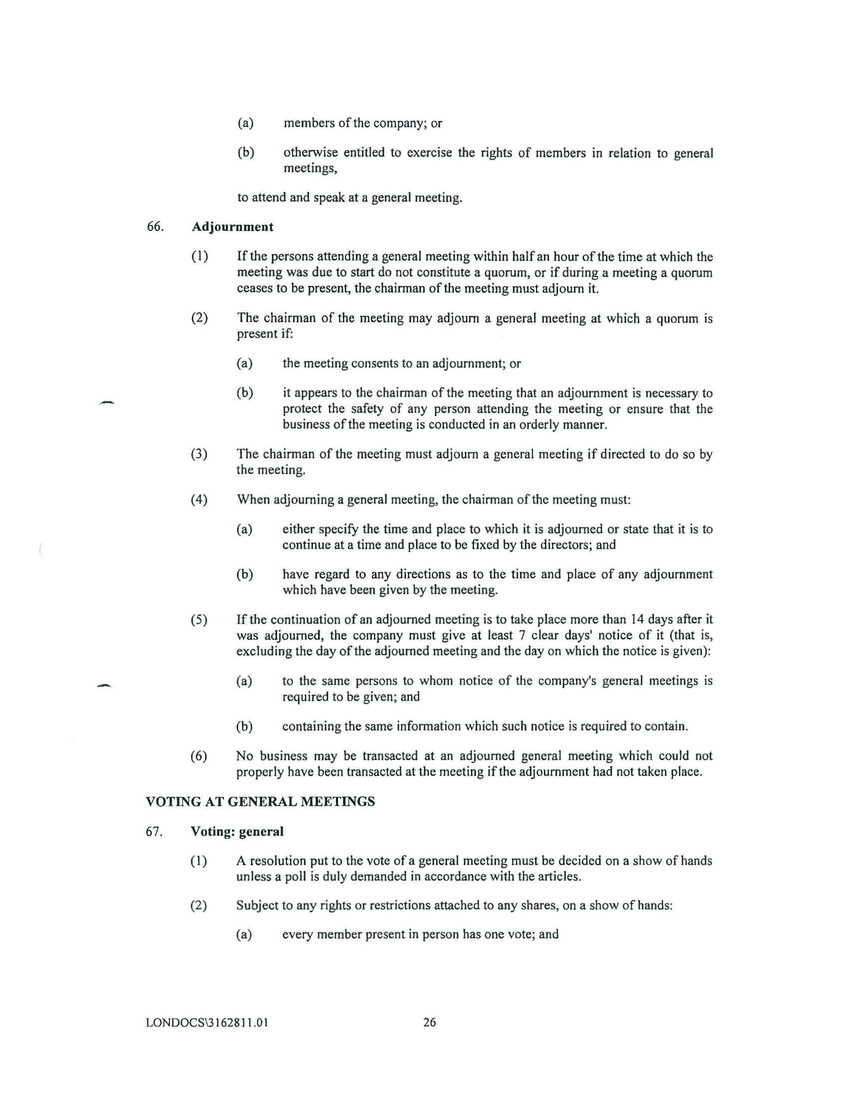 | members of the company; or otherwise entitled to exercise the rights of members in relation to general meetings, to attend and speak at a general meeting. Adjournment Ifthe persons attending a general meeting within half an hour of the time at which the meeting was due to start do not constitute a quorum, or if during a meeting a quorum ceases to be present, the chainnan of the meeting must adjourn it. The chairman of the meeting may adjourn a general meeting at which a quorum is present if: the meeting consents to an adjournment; or it appears to the chainnan of the meeting that an adjournment is necessary to protect the safety of any person attending the meeting or ensure that the business of the meeting is conducted in an orderly manner . The chairman of the meeting must adjourn a general meeting if directed to do so by the meeting. When adjourning a general meeting, the chairman of the meeting must: either specify the time and place to which it is adjourned or state that it is to continue at a time and place to be fixed by the directors; and have regard to any directions as to the time and place of any adjournment which have been given by the meeting. Ifthe continuation of an adjourned meeting is to take place more than 14 days after it was adjourned, the company must give at least 7 clear days' notice of it (that is, excluding the day of the adjourned meeting and the day on which the notice is given): to the same persons to whom notice of the company's general meetings is required to be given; and containing the same information which such notice is required to contain. No business may be transacted at an adjourned general meeting which could not properly have been transacted at the meeting ifthe adjournment had not taken place. VOTING AT GENERAL MEETINGS Voting: general A resolution put to the vote of a general meeting must be decided on a show of hands unless a poll is duly demanded in accordance with the articles. Subject to any rights or restrictions attached to any shares, on a show of hands: every member present in person has one vote; and |
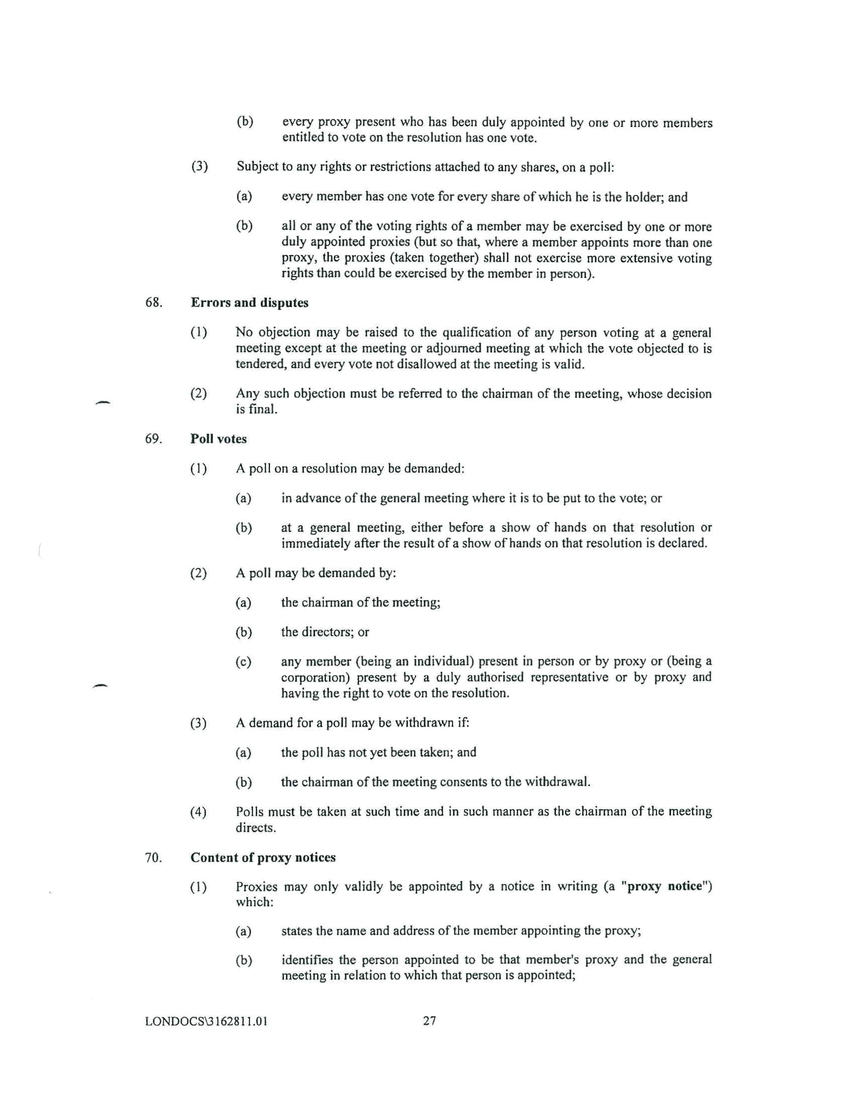 | every proxy present who has been duly appointed by one or more members entitled to vote on the resolution has one vote. Subject to any rights or restrictions attached to any shares, on a poll: every member has one vote for every share of which he is the holder; and all or any of the voting rights of a member may be exercised by one or more duly appointed proxies (but so that, where a member appoints more than one proxy, the proxies (taken together) shall not exercise more extensive voting rights than could be exercised by the member in person). Errors and disputes No objection may be raised to the qualification of any person voting at a general meeting except at the meeting or adjourned meeting at which the vote objected to is tendered, and every vote not disallowed at the meeting is valid. (2)Any such objection must be referred to the chairman of the meeting, whose decision is final. Poll votes A poll on a resolution may be demanded: in advance of the general meeting where it is to be put to the vote; or at a general meeting, either before a show of hands on that resolution or immediately after the result of a show of hands on that resolution is declared . A poll may be demanded by: the chairman of the meeting; the directors; or - A demand for a poll may be withdrawn if: the poll has not yet been taken; and the chairman of the meeting consents to the withdrawal. Polls must be taken at such time and in such manner as the chairman of the meeting directs. Content of proxy notices Proxies may only validly be appointed by a notice in writing (a "proxy notice") which : states the name and address of the member appointing the proxy; identifies the person appointed to be that member's proxy and the general meeting in relation to which that person is appointed; |
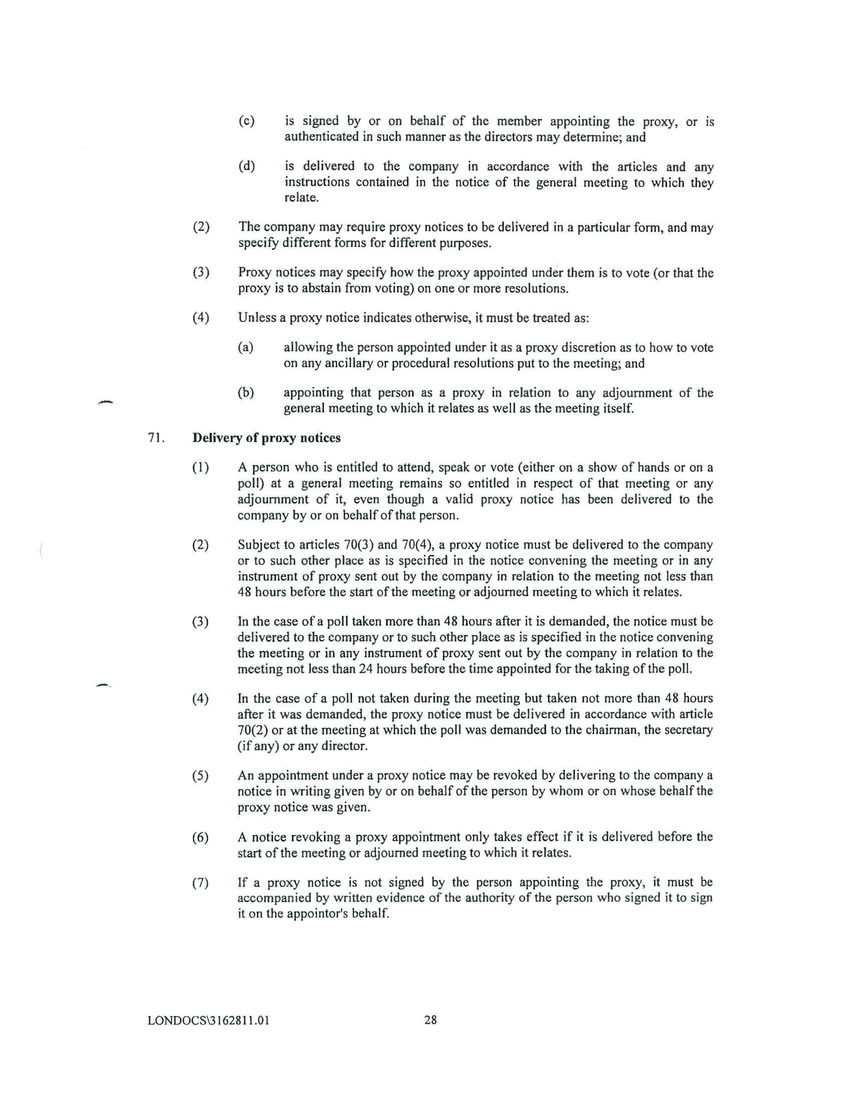 | is signed by or on behalf of the member appomtmg the proxy, or is authenticated in such manner as the directors may determine; and is delivered to the company in accordance with the articles and any instructions contained in the notice of the general meeting to which they relate. The company may require proxy notices to be delivered in a particular form, and may specify different forms for different purposes. Proxy notices may specify how the proxy appointed under them is to vote (or that the proxy is to abstain from voting) on one or more resolutions. Unless a proxy notice indicates otherwise, it must be treated as: allowing the person appointed under it as a proxy discretion as to how to vote on any ancillary or procedural resolutions put to the meeting; and appointing that person as a proxy in relation to any adjournment of the general meeting to which it relates as well as the meeting itself. 7I .Delivery of proxy notices A person who is entitled to attend, speak or vote (either on a show of hands or on a poll) at a general meeting remains so entitled in respect of that meeting or any adjournment of it, even though a valid proxy notice has been delivered to the company by or on behalf of that person. Subject to articles 70(3) and 70(4), a proxy notice must be delivered to the company or to such other place as is specified in the notice convening the meeting or in any instrument of proxy sent out by the company in relation to the meeting not less than 48 hours before the start of the meeting or adjourned meeting to which it relates. In the case of a poll taken more than 48 hours after it is demanded, the notice must be delivered to the company or to such other place as is specified in the notice convening the meeting or in any instrument of proxy sent out by the company in relation to the meeting not Jess than 24 hours before the time appointed for the taking of the poll. In the case of a poll not taken during the meeting but taken not more than 48 hours after it was demanded, the proxy notice must be delivered in accordance with article 70(2) or at the meeting at which the poll was demanded to the chairman, the secretary (if any) or any director. An appointment under a proxy notice may be revoked by delivering to the company a notice in writing given by or on behalf of the person by whom or on whose behalf the proxy notice was given. A notice revoking a proxy appointment only takes effect if it is delivered before the start of the meeting or adjourned meeting to which it relates. If a proxy notice is not signed by the person appointing the proxy, it must be accompanied by written evidence of the authority of the person who signed it to sign it on the appointor's behalf. |
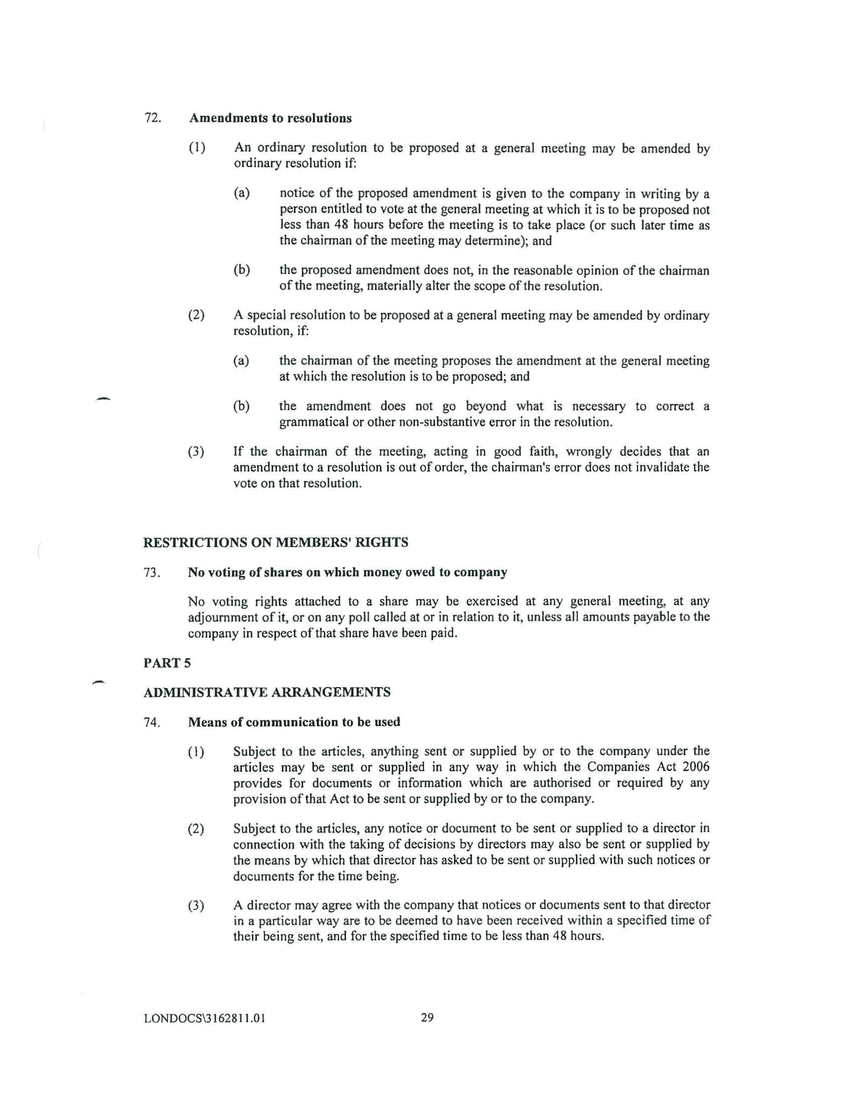 | Amendments to resolutions An ordinary resolution to be proposed at a general meeting may be amended by ordinary resolution if: notice of the proposed amendment is given to the company in writing by a person entitled to vote at the general meeting at which it is to be proposed not less than 48 hours before the meeting is to take place (or such later time as the chairman of the meeting may determine); and the proposed amendment does not, in the reasonable opinion of the chairman of the meeting, materially alter the scope of the resolution . A special resolution to be proposed at a general meeting may be amended by ordinary resolution, if: the chairman of the meeting proposes the amendment at the general meeting at which the resolution is to be proposed; and the amendment does not go beyond what is necessary to correct a grammatical or other non-substantive error in the resolution. If the chairman of the meeting, acting in good faith, wrongly decides that an amendment to a resolution is out of order, the chairman's error does not invalidate the vote on that resolution. RESTRICTIONS ON MEMBERS' RIGHTS No voting of shares on which money owed to company No voting rights attached to a share may be exercised at any general meeting, at any adjournment of it, or on any poll called at or in relation to it, unless all amounts payable to the company in respect of that share have been paid. PARTS ADMINISTRATIVE ARRANGEMENTS Means of communication to be used ( l) Subject to the articles, anything sent or supplied by or to the company under the articles may be sent or supplied in any way in which the Companies Act 2006 provides for documents or information which are authorised or required by any provision of that Act to be sent or supplied by or to the company. Subject to the articles, any notice or document to be sent or supplied to a director in connection with the taking of decisions by directors may also be sent or supplied by the means by which that director has asked to be sent or supplied with such notices or documents for the time being. A director may agree with the company that notices or documents sent to that director in a particular way are to be deemed to have been received within a specified time of their being sent, and for the specified time to be less than 48 hours. |
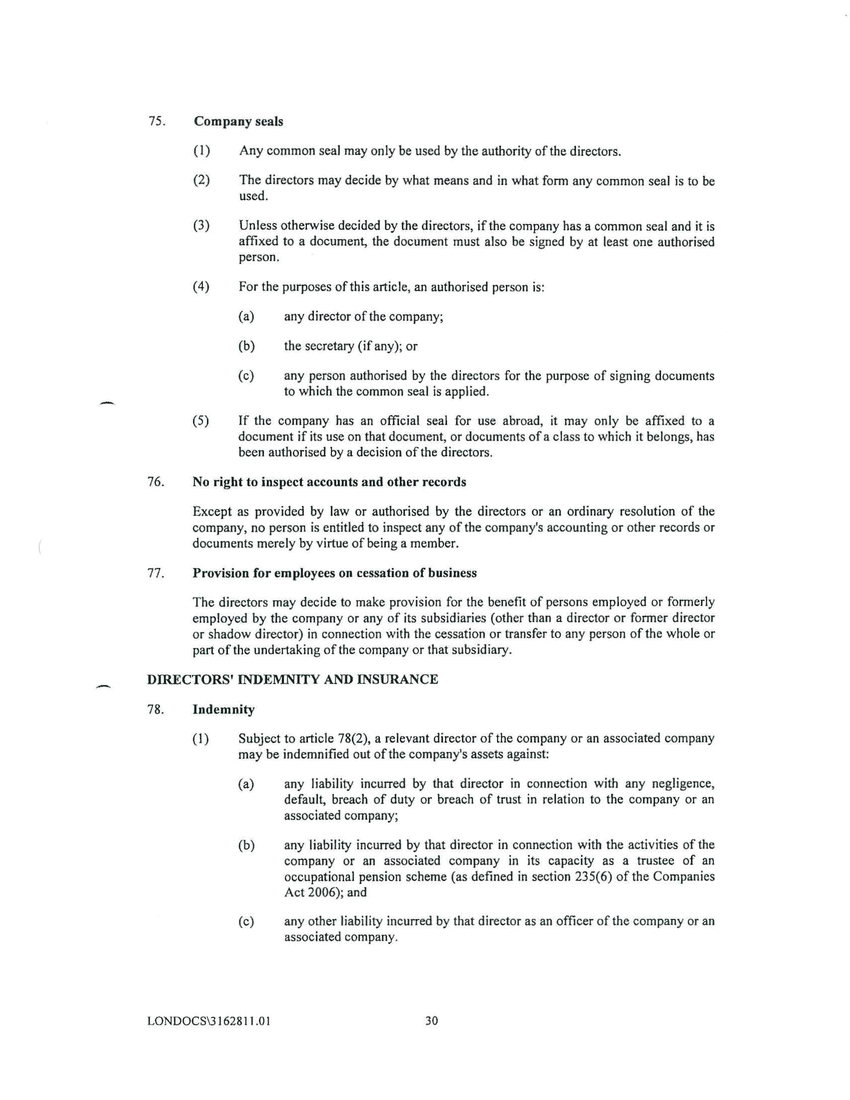 | Company seals Any common seal may only be used by the authority of the directors. The directors may decide by what means and in what fonn any common seal is to be used. Unless otherwise decided by the directors, ifthe company has a common seal and it is affixed to a document, the document must also be signed by at least one authorised person . For the purposes of this article, an authorised person is: any director of the company ; the secretary (if any); or any person authorised by the directors for the purpose of signing documents to which the common seal is applied. If the company has an official seal for use abroad, it may only be affixed to a document if its use on that document, or documents of a class to which it belongs, has been authorised by a decision of the directors. No right to inspect accounts and other records Except as provided by law or authorised by the directors or an ordinary resolution of the company, no person is entitled to inspect any of the company's accounting or other records or documents merely by virtue of being a member. Provision for employees on cessation of business The directors may decide to make provision for the benefit of persons employed or formerly employed by the company or any of its subsidiaries (other than a director or former director or shadow director) in connection with the cessation or transfer to any person of the whole or part of the undertaking of the company or that subsidiary. DIRECTORS' INDEMNITY AND INSURANCE Indemnity Subject to article 78(2), a relevant director of the company or an associated company may be indemnified out of the company's assets against: any liability incurred by that director in connection with any negligence, default, breach of duty or breach of trust in relation to the company or an associated company; any liability incurred by that director in connection with the activities of the company or an associated company in its capacity as a trustee of an occupational pension scheme (as defined in section 235(6) of the Companies Act 2006); and any other liability incurred by that director as an officer of the company or an associated company. |
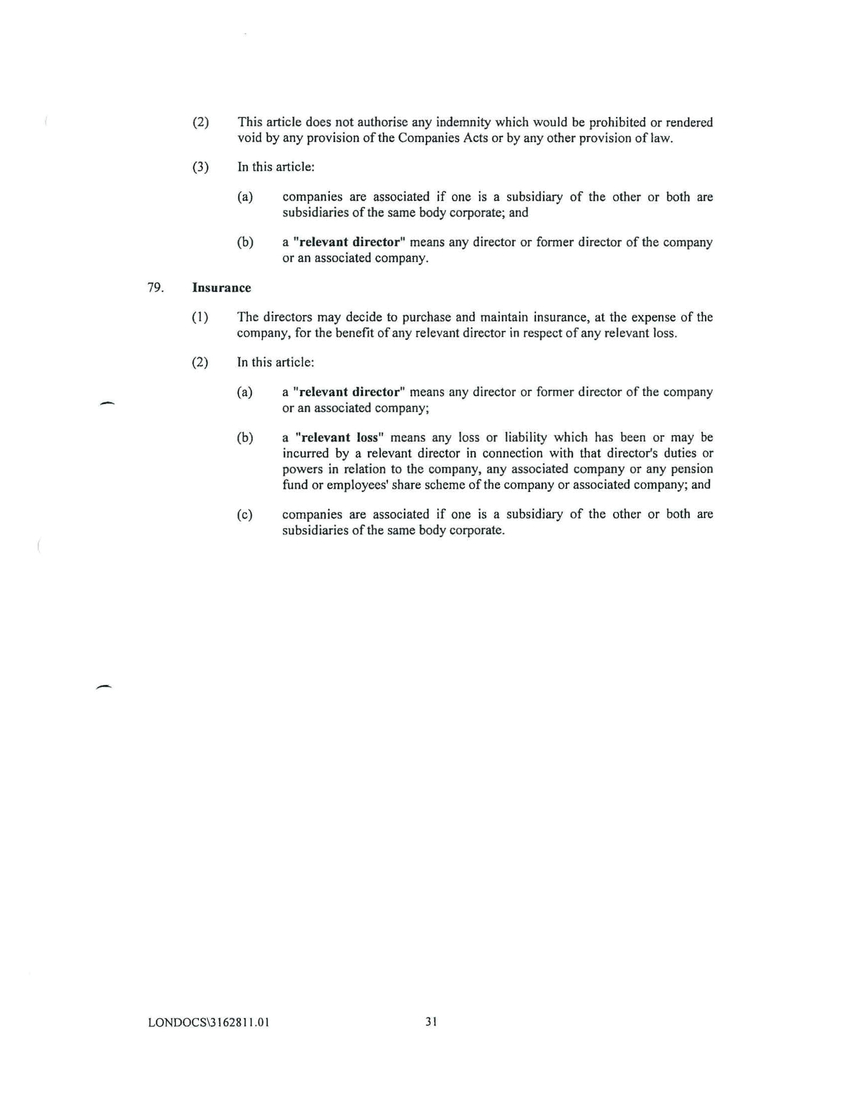 | This article does not authorise any indemnity which wou ld be prohibited or rendered void by any provision of the Companies Acts or by any other provision of law. In th is article: companies are associated if one is a subsidiary of the other or both are subsidiaries of the same body corporate; and a "relevant director" means any director or former director of the company or an associated company. Insurance The directors may decide to purchase and maintain insurance, at the expense of the company, for the benefit of any relevant director in respect of any relevant loss. ln this article: a "relevant director" means any director or former director of the company or an associated company; a "relevant loss" means any loss or liability which has been or may be incurred by a relevant director in connection with that director's duties or powers in relation to the company, any associated company or any pension fund or employees' share scheme of the company or associated company; and companies are associated if one is a subsidiary of the other or both are subsidiaries of the same body corporate. - |